#and when she rejects touga with everything she has
Text
i love how during nanami’s drive she’s like “touga you gotta listen to me this guy is fucked up i just saw him performing some of the most horrifically unspeakable acts of violence” and akio is like [chuckling smugly] “hmmm….. what you saw….. yes, of course, a child’s mind is clouded by their limited perception….. and yet…. what you think you saw is merely an illusion…… due to solipsism.” and nanami doesn’t even pause to consider it, immediately she’s just like “what the fuck is this evil freak talking about.”
#u#nanami#akio#touga#he can’t trip her up with his fancy words she knows what she saw!!!!#that scene makes my gut churn so bad#like even worse than all the other car scenes#bc nanami is ACTIVELY trying to escape#and they KNOW it and they’re lording it over her????#the fact that they have all the power to control where she goes and how she lives her life#and when she rejects touga with everything she has#he still lets akio. um. ‘show her the end of the world.’#touga redemption arc but every time he remembers that evening he cringes so forcefully that he literally dies and now he’s dead because he#took too much psychic damage remembering his own actions.#like he’s also just really embarrassing himself here#trying to act like he’s in on some cosmic joke that nanami doesn’t have access to#NO!!!!!! YOU LOOK LIKE A FOOL AND YOU ASSAULTED YOUR BABY SISTER. DIE.#anyway. i love you nanami i love you nanami i love you nanami i love you nanami
215 notes
·
View notes
Note
You know I like Nanami as much as the next anon, but I really don't think she's sane. I'm absolutely sure that if Touga tried this shit at the beginning of the series she'd jump on him head first. It's just everything she went through in the series, learning to question/defy him (she chose her egg despite his very vocal disagreement!) and the whole "not her brother" deal (correct me if I'm wrong, but she never learned he was, in the end, her brother, did she?) made her want to break the connection (hence the transfer attempt). I'm not a witch apologist (the dichotomy is false+fucked up and that's a big deal in the show, I sure hope anon was just joking a bit), but I love me a girl who actually learns from experiences and grows over herself.
Anon's referring to this post.
God.
To be told that my thoughts on Utena are spicy. I didn't think such a thing was possible. The show itself is pure spice. I'm a little shook. who knew?
I won't deny any of what you said, it's all very valid. Except that I'm not sure that Nanami ever really wanted to fuck her brother. Oh, she had a crush on him, but we see in that episode where she first feels she has no legitimate connection to him and then is horrified by what's happening with Anthy and Akio and ultimately rejects her brother--
To me, what I got out of it, was that Nanami was young and messed up but had no idea of what she was saying she wanted. She thought she wanted her brother but she didn't know what wanting really meant.
But yes, she learns things through the series, and eventually ends up in a place where she says everything disgusts her and god does she hate these fucked up people. And to me, that's when she hits the point of sanity and we look at every other character, including Utena, and go "Oh no"
18 notes
·
View notes
Text
the utena show’s ending is extremely powerful on its own yes but utena’s final apology? to anthy of not being able to be her prince in the end never stuck right with me. and I think that’s cause in a sense it’s still centering the prince as important, as aspirational, that maybe it could have been a better ending for them—that utena could’ve survived if she were her prince. and of course I might be reaching with that possibly probably but I still wanted to air that opinion out (maybe someone else has similar misgivings as I do and can expand on it so there).
but the real problem for me is that show anthy still very much places utena as a savior figure, as her “prince”. while I live for anthy’s savage verbal takedown of akio as a powerless coward trapped in a Sisyphean game of pretend for all eternity but even so she herself is still shown to subscribe to the dogma of the heroic prince. even visually anthy’s idealization of utena is displayed with her dressed in pink. this visual marker is carried over into the movie with anthy’s bridal gown changing from red (which makes sense since anthy is indian coded and an indian bride’s sari is traditionally red) to white and pink, connoting her as utena’s princess.
movie anthy’s placement of utena onto a pedestal of princehood also often extends beyond subtext and into the text itself, a key example being the scene right before utena’s famed car wash makeover where anthy says “you’re the prince of the academy now, every miracle and all eternity is yours…so long as you stay in this world.” anthy believes that you can only exercise power, have power, be happy, be free within the system, and it’s important to note that there is very much truth in that notion but this power I’m referring to is that of self actualization, the power of maturity. yet…utena rejects that noise, she says no, she says fuck that let’s go be free in the outside world.
if the show is about breaking away from the confines of abuse, then the movie is about breaking away from the confines of trauma. it’s extremely powerful when anthy takes the steps out of ohtori; it’s hard even just to find the strength to leave an abusive situation let alone actively do it. but the pain remains, trauma doesn’t disappear it’s haunting it’s ghostly sometimes literally manifesting. both movie utena and anthy are hounded and bound to apparitions they’ve forgotten are actually dead.
touga died years ago sacrificing himself for nothing in the end and became princely an ideal to strive for and utena has to come to grips with that and she basically says no you don’t control me my grief my trauma does not control me thank you for being my prince but I can’t be a prince I don’t want to be it’s not real
anthy is real
I am real
akio is abuse he is torment and toxicity he is anthy’s monster, maybe a monster that she created once upon a time but he chose to perpetuate his monstrosity. and when confronted with his actions he couldn’t face it he hurt her more made it her fault for the hurt he caused her and he died he’s dead he’s gone but he remains in the ground anthy buried him beneath the roses. the rose garden is a prison she is the only one held captive by the roses and it grows up up high up but it’s still there the roses remain he’s still there in her mind and he’ll never leave but he’s not in control. he’s dead, he’s been dead for so long he remains but he’s not real and he’s no prince because the prince was a lie that never existed it’s not real
utena is real
I am real
and they blaze past everything. there are obstacles but there are friends too who aren’t there yet but they’re on the path they’re trying they’re growing they have high goals they want to reach and someday they will but you can now. it’s anthy’s story it’s anthy journey and it’s hard of course it’s hard
but they break free. they break the castle so huge so big so impossible but it wasn’t real
it’s just rose petals flying in the wind
akio doesn’t control her and though it might be so that she and utena can’t make it outside, that they have to continue as princesses stuck in the role that people give them but they don’t have power over them, they’re free and no longer draped in any costume or performance, they’re truth out of her well to shame mankind and that’s fucking awesome. they might not make it, they might fail like the broken down husks of those who came before them, but they can try they’re free to try. they have the power to try. to revolutionize the world. to revolutionize their world.
“the outside world has no roads, but you can always build new roads.”
I binged the entire series and the movie last year around March maybe, sometime right before quarantine…and I haven’t been able to stop thinking about it, analyzing it, since. I’m pretty sure it radicalized me and honestly I’m glad it did. revolutionary girl utena speaks truth to power and exists as a creative work in a way that I don’t think anything else has or will. it’s fundamentally itself but simultaneously thrives on external interpretation. it’s both an enigma wrapped in a mystery and as obvious and unsubtle as a trainwreck. above is my favorite quote of the entire franchise because it’s so simple but so profound—you could say it’s my equivalent of “what is grief if not love persevering”.
there are no roads to follow, but you’re open to build your own path your own way. no one defines you but you and that’s simple that’s kinda naive but what’s wrong with that. I’m not sure who originally said this or stated this proverb or whatever, I know I read it somewhere but I’m not sure where, and I’m definitely paraphrasing but
adults are so quick to say the world is unfair and be done with it, but a child would look at that and say: why not make it fair? that’s really simple and it’s innocent of course but it’s still true. why can’t we make things fair, because we definitely could it’s not impossible.
I’m not sure how to end this post—I definitely should cause it’s plenty long already—but rgu is highly foundational to me on a visceral level. it’s helped me in ways shifted me in ways I can’t describe and I can’t really imagine myself now existing without its influence. the best way I could describe its impact its power its importance really boils down to
the outside world has no roads, but you can always build new roads.
words to live by.
#revolutionary girl utena#rgu#adolescence of utena#adolescence apocalypse#shoujo kakumei utena#sku#utena tenjou#anthy himemiya
144 notes
·
View notes
Text
INNATE POWERS AND WEAPON RELATED POWERS.
PART ONE: TOWA.
Something that has to be differentiated in Inuyasha is whether a power or technique is innate to the demon, half-demon or human using it, or if it's tied ot a weapon.
INNATE POWERS are those that a demon, half-demon or human can use without any tool. They can be strengthened by a tool or channeled through it, but the power itself is innate. For example, Kagome has spiritual powers that she can use without a weapon.
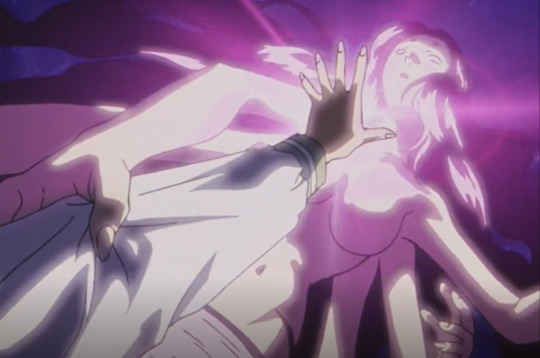
And she can channel them through her arrows to improve her range and attack power. Her ability to see spiritual and demonic auras is also innate. Miroku's spiritual powers work the same. He can strengthen them by channeling his powers through his staff or sutras, but he also can use them without those tools.
Now, Inuyasha and Sesshomaru actually have a lot of innate power, but few innate techniques. For Inuyasha, his innate techniques are Iron Reaver and Blood Blades. For Sesshomaru, his innate techniques are Poison Claws and Poison Whip. Everything else Inuyasha and Sesshomaru do comes from mastering demon-made weapons that have their own techniques that only their wielders can use, and they have to master the weapon first.
The Windscar isn't innate to Inuyasha. It's innate to Tessaiga. Both Inu no Taisho and Sesshomaru could use the Windscar when wielding Tessaiga. What Inuyasha did was improve his ability to use Tessaiga and discover new techniques.
Ressurrection isn't innate to Sesshomaru, it's innate to Tenseiga. And Azure Dragon is innate to Tokijin.
Therefore, Moroha can inherit Kagome's spiritual powers, and Inuyasha's Iron Reaver and Blood Blades, but she can't inherit the Wind Scar or other techniques that are exclusive to Tessaiga. She would have to be wielding Tessaiga for that.
And the thing about the twins is that, unlike Inuyasha and Sesshomaru, who use demon weapons that allow them to use specific techniques tied to the weapon, Towa and Setsuna are using non-magical weapons. Towa's sword is a replica, and Setsuna's naginata is human-made, and thus cannot have any powers or tehcniques unique to it. This means that all of the twins' powers are INNATE, and they use their weapons to channel them, just like Kagome channels her spiritual powers through her arrows.
This makes them different from Moroha, who, unlike the twins, has a demonic weapon that gives her the techniques Crimson Dragon Wave and Backslash Wave. These are not innate powers for Moroha, she's mastered a demonic weapon's technique, just like Inuyasha mastered the Wind Scar and other techniques from the Tessaiga, but the Tessaiga's techniques weren't innate to Inuyasha.
And, the interesting thing about the twins powers is that they clearly have a powerset that is very clearly a mix of Sesshomaru and something else, while with Moroha we can very clearly see Inuyasha, Kagome and even Touga as the source of her powers. And, if we talk Inukimi / Sessmom, given that Inuyasha DOESN'T HAVE Poison Claws or Poison Whip and has Iron Reaver and Blood Blades instead, I'd say that those are her powers and Sesshomaru inherited them from her instead of from Touga. Inukimi is also heavily associated with death and resurrection.
So where do the twins unexplainable powers come from? Their mother's side, Kagura's half-demon family, which is also the place where their human part comes from.
TOWA'S POWERS
1. Power blade : Towa channels her demonic powers through either her hands or the handle of her broken sword in order to use blades. This is a fusion between Sesshomaru's ability to manipulate demonic energy (poison whip) and Byakuya's power blade.
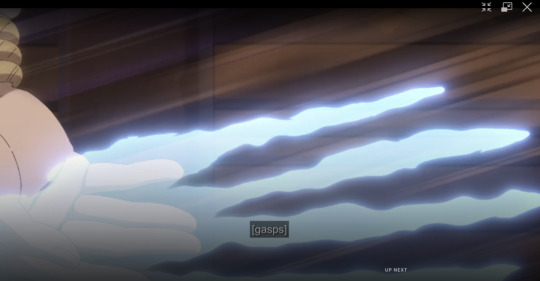
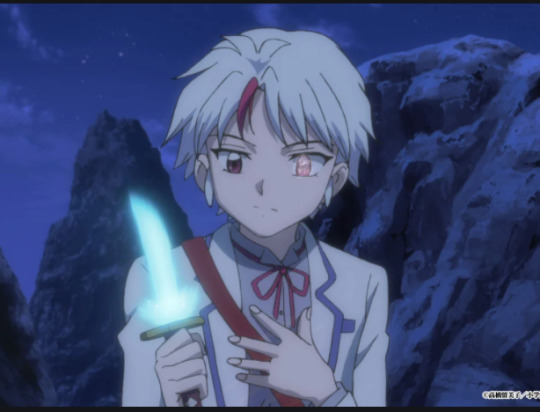



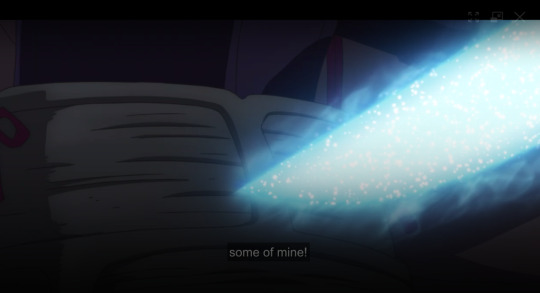
2. Energy absorption: This power comes from Naraku. Naraku was notorious for his ability to absorb other demons and their powers in order to strengthen himself. Likewise, Towa uses her powerblade to pierce her enemies and once she has made contact, she can absorb their energy to strengthen herself. The main difference is that Towa's power-up is temporary, while Naraku's was permanent, and that she can absorb less power at a time than Naraku.
Meanwhile, Sesshomaru never has had power absorption abilities. He had incrediby high innate demonic power on his own. Absorbing others' powers and using the shikon jewel / the rainbow pearl to increase one owns powers was very much a Naraku thing, while Sesshomaru rejected external power-ups and only used his own powers and weapons that he could channel his powers through.
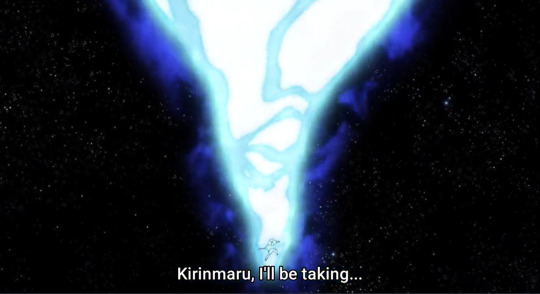
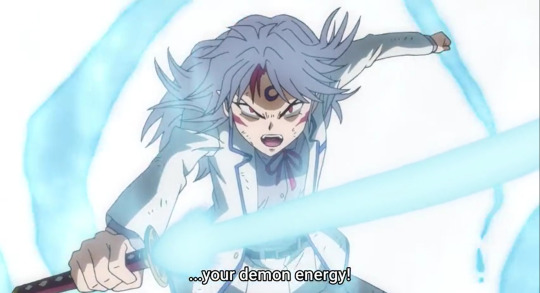
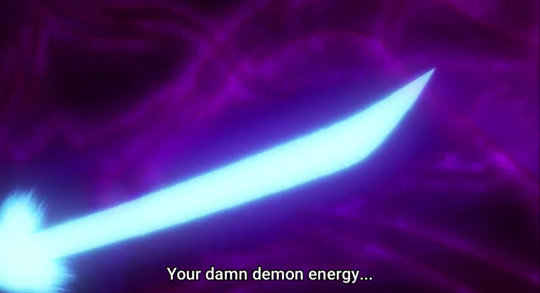
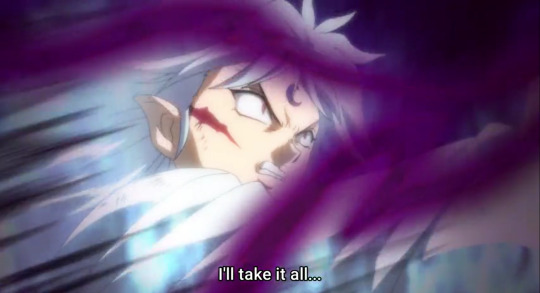
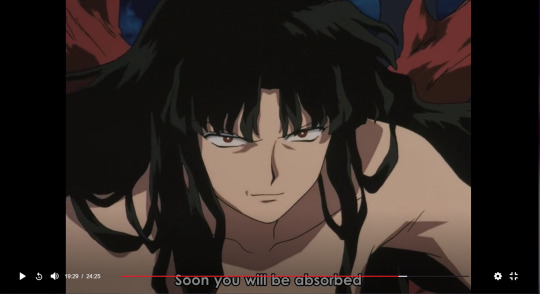
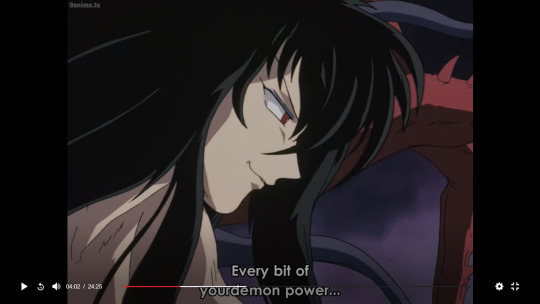
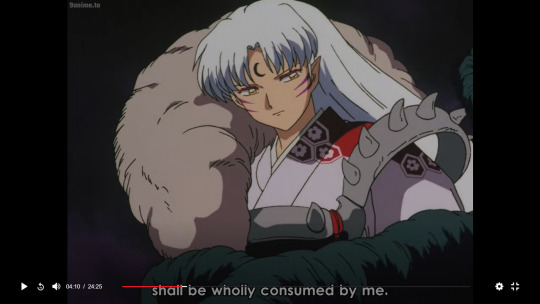
Naraku and Towa even have pretty much the same dialogue while trying to absorb the powers of a Daiyoukai, which they ultimately failed at because said Daiyoukai was too strong for them to absorb (Towa) or because he got interrupted (Naraku). Note that Naraku's theme music was playing for Towa when she was trying to absorb Kirinmaru's powers (or it was a Kirinmaru theme that was very obviously sampling the most recognizable parts of Naraku's, the effect is the same)
3. Azure Dragon Strike: For Sesshomaru, Azure Dragon Strike was not an innate power, just like Resurrection was not an innate power. Azure Dragon was tied to Tokijin, just like Resurrection was tied to Tenseiga. So how come Towa has Azure Dragon? Because of the origin of the Tokijin. Tokijin was a blade made with the fangs of Goshinki, one of Naraku's incarnations who had been able to break Tessaiga.

So the powers of Tokijin come from Goshinki, and Goshinki's powers come from Naraku, his creator. Towa can inherit Azure Dragon because of her connection to Naraku, not because of her connection to Sesshomaru.
4. Energy barrier: This is very much inherited from Naraku. Naraku specialized in defensive techniques like regeneration and energy barriers, which are things that Sesshomaru is actually terrible at. Sesshomaru has never made a defensive energy barrier in his life, his fighting style is hyper offensive, based on being faster, more agile and more powerful than his enemies. But Sesshomaru has ZERO defensive techniques and his regeneration and constitution are terrible for demonic standards.
When Sesshomaru actually takes a serious hit, he goes down hard, retreats and takes a while to heal. Inuyasha, who is actually the sturdier one of the two brothers, is able to continue fighting even after being repeatedly stabbed through the torso. And Sesshomaru took around an entire year to regenerate his arm, while Naraku could survive having 90% of his body disintegrated by Kagome's arrows, and later on, regenerated from similar injuries almost instantaneously. He also spent most of the series making stronger and stronger energy barriers. There were several arcs about the gang trying to figure out how to get past Naraku's newest defensive technique, barrier or immortal-level regeneration.

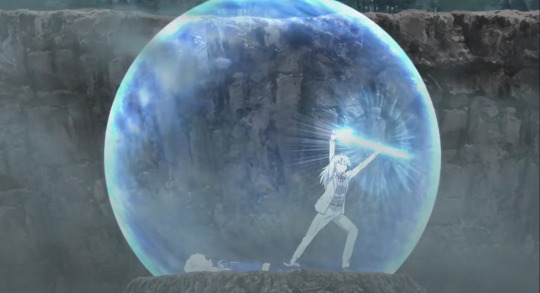
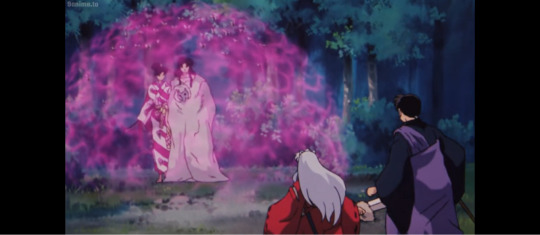
Just like the power absorption parallels Towa vs Kirinmaru with Naraku vs Sesshomaru, Towa's barrier also parallels a Naraku scene. The first time Towa creates an energy barrier, she places herself in front of Setsuna's body and shields them both with an energy barrier from Kirinmaru's powerful attack. The first time Naraku creates a complete energy barrier, he places himself in front of Kagura and shields them both with an energy barrier from Inuyasha's powerful attack. Naraku's barrier even glowed blue, just like Towa's, before stabilizing as purple.
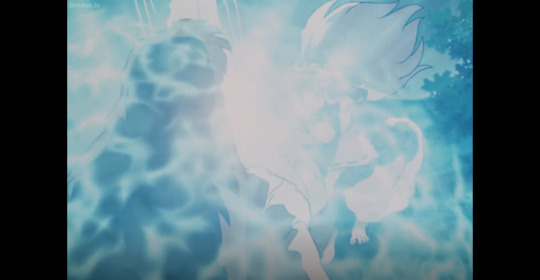
5. Shapeshifting : Towa's hair shapeshifts into being longer or shorter depending on her state (human, half-demon, demon). This doesn't come from Inuyasha, whose hair stayed the same length in all three forms (human, half-demon, demon) or Sesshomaru, whose hair never changed length. Naraku, though? He did that all the time.
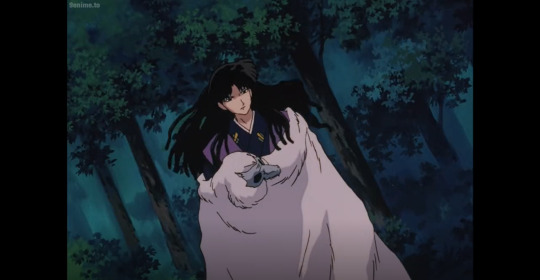
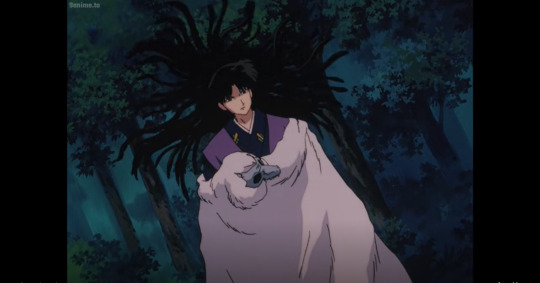

And so does Towa

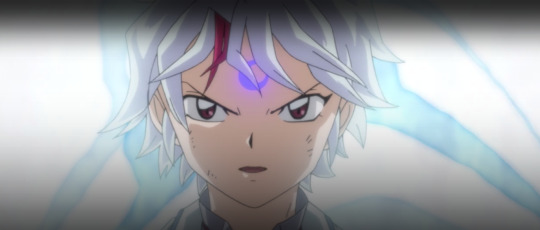

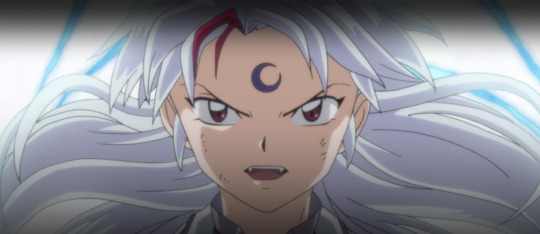
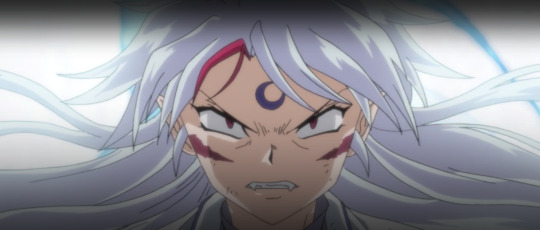
6. Ability to choose her human night: Yet another Naraku trait. Towa's demonic powers had a subconscious and self-imposed seal on them after she made the promise that she wouldn't use them in the modern era to Souta. She didn't use demonic powers, and SHE DIDN'T TURN HUMAN IN THE NEW MOON either.
Regular half-demons have very specific biological triggers for their human time of weakness, and they can't control when it happens or for how long. For Inuyasha and Towa, it's the new moon. For Shiori, it's the eclipse. Jinenji had a normal human time of weakness as well.
But Towa was able to subsconsciously suppress her human time of weakness along with her other demonic traits, only starting to be affected by them after she accepted herself as a half-demon and returned to the feudal era. That implies that Towa can control her human time of weakness, because she can subconsciously stop her human nights from happening just like she suppressed her other demonic traits in the modern era. The only half-demon who could control his human time of weakness, being able to choose when to have it was Naraku, because Naraku is an amalgamation of many different demons with a human core.
Furthermore, Towa's eyes during human night are even the same color of reddish brown as Naraku's, while Inuyasha's turned a human gray. So, not only can Towa subconsciously control her human nights and choose not to have them, like Naraku, but she maintains some of her demonic characteristics during it: her red streak and her red eyes, which becomes a reddish brown very similar to Naraku's. And remember, Naraku also maintained demonic traits during his human time of weakness, he used it to experiment with his powers to strengthen himself and dispose of unnecessary demonic parts or traits.

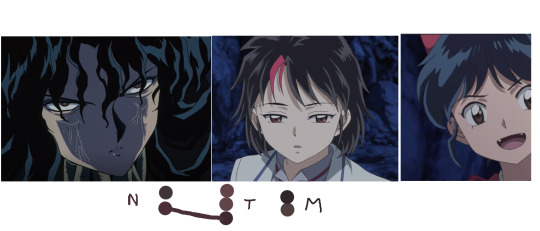
Moroha, on the other hand, actually has brown eyes that don't have a red undertone, and her eye color is very different from Towa's and Naraku's. Inuyasha's eyes don't have any gold undertones, either, and he doesn't keep any of his demonic characteristics during his human time of weakness. And neither do any other half demons other than Naraku.
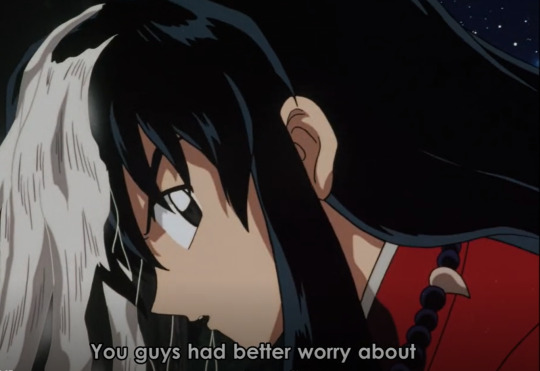
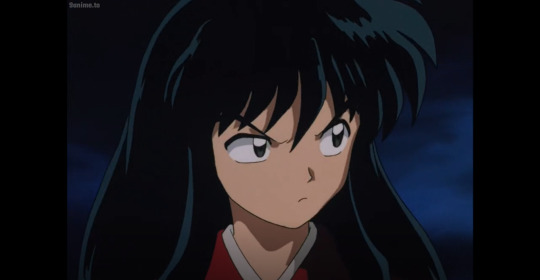
Oh, and talking about human nights and shapeshifting, Towa's hair changes again during her human night, becoming longer.

And very similar to Muso / Onigumo's hair. And Onigumo was Naraku's human core, and therefore the source of the twins' human blood.
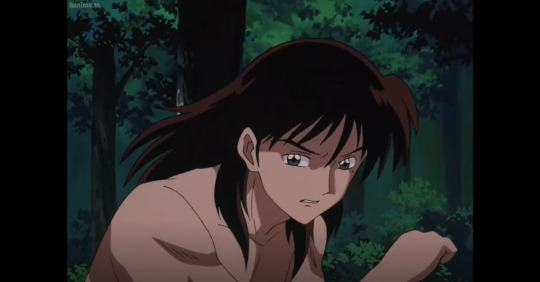
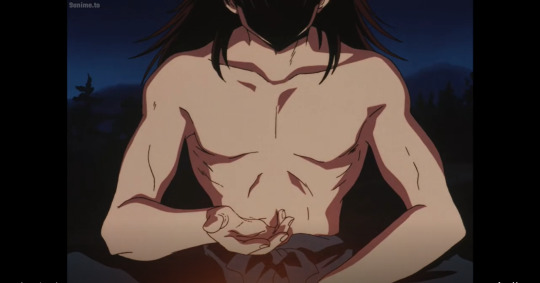
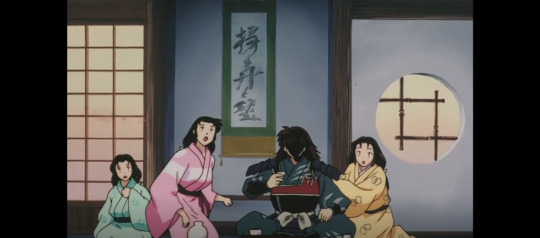
So, as you can see, just like Moroha really takes after her paternal grandfather Touga, Towa takes after her maternal grandfather, Naraku, just as much. And, of course, she looks nothing like her adoptive sister Rin and has inherited nothing from her either, because Rin is Sesshomaru's adoptive daughter and she and Towa aren't blood related at all.
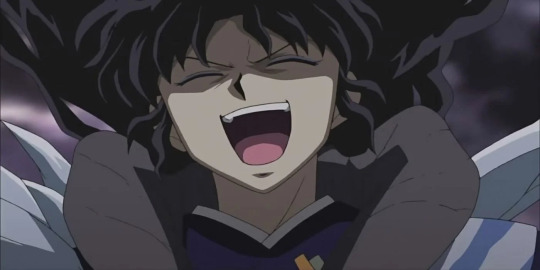
Deal with it, sessrinners.
10 notes
·
View notes
Text
Okay so partially motivated by how many references there were in SPoP and largely bc it's been in my backlog for years and I remembered the whole thing got uploaded to youtube a while ago, I finally got around to watching Revolutionary Girl Utena for the first time so time for some hot takes
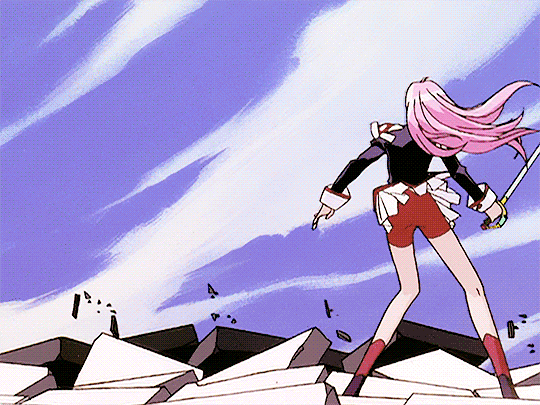
2 clarify I did see the movie about around 2000 which was my introduction to the series, and I did see like 1 episode back in anime club (over a decade ago now tbh) but for the most part I went into this with only a vague sense of the ending and offhand knowledge of a few of the weird comedy episodes so this was mostly a blind watch
Before getting into #spoilers I will say that this ended up being an easy Top 5 and that it's definitely still worth watching (fair warning for the very frequent rape and incest (and sometimes both)), especially if you've somehow also avoided most of the context of this show like me, and it really is one of the rare Nothing Else Like It kind of show (though it has roots in older shoujo like Rose of Versailles and modern stuff like Revue Starlight have picked up its lede)
Okay spoilers from here on
I really only kinda have vague memories of the more knightly take on Utena from the movie so Series!Utena having this powerful Dumb Jock Energy threw me
Like she's out here invoking the Air Bud Rule from minute one

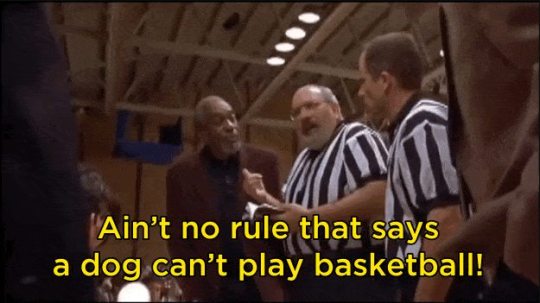
This bit where Akio is going on about some Important Life Lesson thing and she's just fuckin
crab walking im
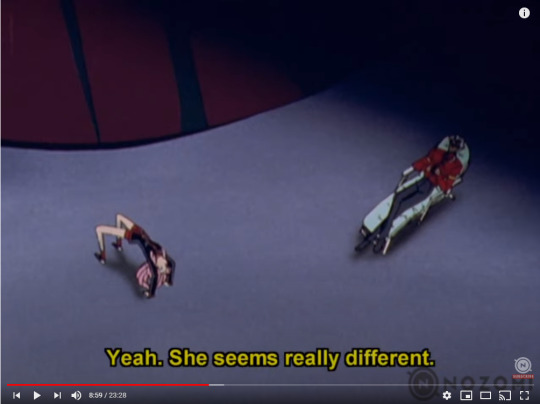
what a hero i love her
I have always kinda been more partial to shoujo than shounen bc the sense of like emotional urgency and the heightened exaggerated feelings are just more compelling to me narratively and what Utena does spectacularly is really drive that to fucking 11 and it permeates every aspect of the show
Like the melodrama of it all is so shameless and it's so committed to letting its visuals and music drive the mood and emotional intensity of its stakes that they kind of speak for themselves and demand to be taken on their own terms rather than having clear or rigid interpretations
Like it's kind of a situation of "yes most of what you're seeing ties into the show's bigger themes and characterization but also you can just vibe to the spectacle as well" like even when it's not on the Dueling Arena there's a theatricality underlying everything that pairs perfectly with the spirit of shoujo even as it... not necessarily contradicts it, but challenges it in some ways and also wants to coexist with it?
And I think that's the interesting thing how it wants to tackle some of these arch concepts tied into the genre while also being deeply intertwined with it. Like it really is a Product Of Its Time in so many ways but it also feels somehow timeless and transgressive in others even now?
Like part of me would be interested to see a remake that took into account 23 years of conversation about how much perceptions of gender and sexuality have changed but at the same time would it lose some essential part of itself in that transition? idk potentially
Also lbr a hypothetical remake wouldn't even attempt to revise anything it would just redo it thus making it pointless
So I know this has been a thing that's been brought up before but seeing it play out dang RGU and NGE really are just companion pieces to each other huh
Subverting the themes and narrative arcs of their respective genres, mysterious quiet girl who's directly the key to everything, the ritual of action setpieces rendered as Actual Ritual in the story, banger OP, comphet ruining everyone's lives
Also they really don't have much in common comparatively but I'm definitely seeing pieces of Utena in Kill la Kill too? Particularly how Mako's arc feels like a fleshing out and expansion from the archetype divergence Wakaba got in that one ep (I can't believe klk was the utena/wakaba au fanfic)

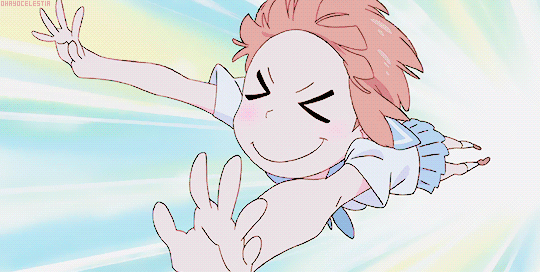
Speaking of which damn he is a sleazy bastard and a gross predator but ngl Akio can Get It he and Ragyo are basically the same character and I guess this is just my type apparently???? oops
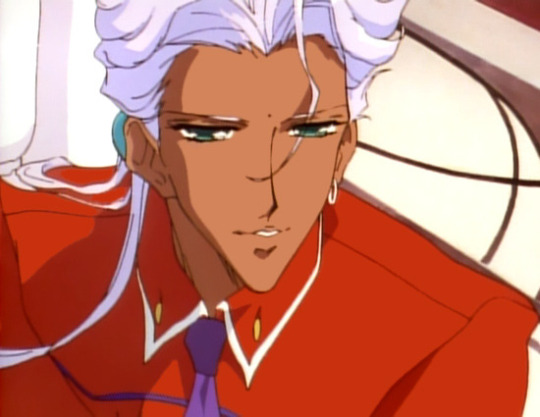

Like I'm recognizing how like really awful he is but also you really can't blame Utena for crushing on him he is super hot and charming
aside i lost it at the audacity of "well even tho i am a man like twice your age (AT LEAST) and took advantage of the situation and also i am clearly not the type to take no for an answer since you didn't reject me you're basically just as bad as me" bruh
The Black Rose Arc is... interesting bc like it borders on superfluous with how it resolves and yet the introduction of a "monster of the week" type power rangers element specifically built to expand on the secondary cast is a pretty inspired choice
again my primary point of introduction to the series was the movie which is basically a remix of the Student Council arc so when I got to 12 I was like wth are they gonna fill the rest of this with? WELP
What I really like about it is that usually this kind of setup-- the 'character is faced with their dark inner thoughts they shy away from and they become a short-term enemy' deal-- ends with the char in question coming to terms with this and overcoming it to become a better person
but here it's just like... they lose and then they just gotta... sit with that, forever. Like it doesn't really change the status quo of their relationships w/ utena or the others but it does just stick around for them and now the audience knows that about them too. like sometimes you just can't take that shit back.
Utena's relationship to queerness, having heard about it tangentially for years but seeing it play out now is also interesting bc while in the grand scheme it doesn't feel necessarily any more ahead of its time than something like Cardcaptor Sakura there is a casualness to it that's distinct
Like for the most part it's either kind of the tangential fluff that even then was part of shoujo as a standard but then there's also stuff like the Akio/Touga or Touga/Saionji hinting or Kozue's casual pass at Anthy in addition to the maintext Juri/Shiori push-pull and ofc the subtext-but-maintext Utena/Anthy threads
I wanna take a moment to talk about Juri bc of how kind of in the spirit of the show itself it plays things both with and against the grain with her
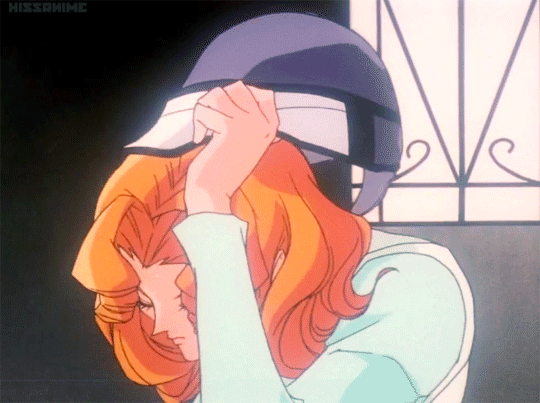
Like she's a Tragic Lesbian which is nothing new but usually this character type (and Distinctively Lesbian characters in general) in anime/manga tend to be portrayed as being very predatory, invasive and either played for laughs or to repulse the audience, so the degree of empathy RGU shows her in 97 is rare to see even now.
Like there is a "safeness" to her bc of how unattainable Shiori is (though their arc ends in a decidedly ambiguious way), but it doesn't really feel like she's getting the short end of the stick over the more straight-leaning characters bc arguably all of the relationships here are defined by an aspect of chasing the unattainable, echoing Utena's own quixotic search for her Prince, and her choosing to remain closeted feels realistic *especially because* of the surrounding context of how heteronormative the world she exists in is. Like the character is aware of that and is navigating it in a way that feels honest
Speaking of which it's interesting how the reveal of Juri's pining for Shiori in Ep 7 echoes the bigger reveal of Utena/Anthy bc of how it plays up this heterocentric love triangle or at least it seems to be but then the cards are on the table and no that's really not what it is at all, and it feels significant that after spending most of the series naively oblivious to Juri’s feelings and what she wants out of a relationship with Shiori that Utena finally Gets It in Ep 37
Is it a coincidence Juri actually gets to be the one to point it out? No
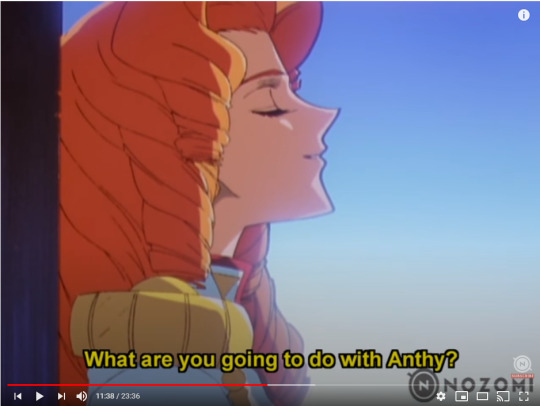
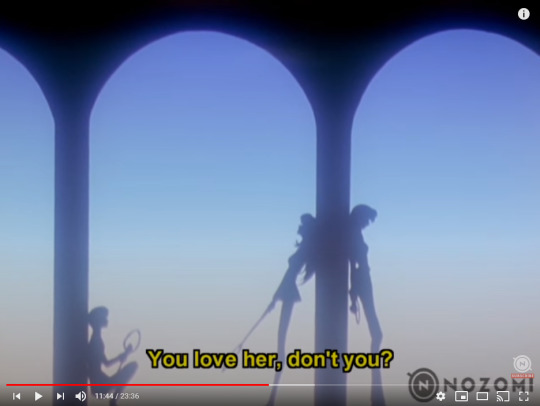
Speaking of triangles big ups to the Ruka/Juri/Shiori one honestly bc of how hard it commits to the unknown third result of a LT where absolutely no one comes out happy and it actually works even with the handicap of Ruka basically coming out of nowhere just for these two episodes
Like all three of them want the one person who's absolutely never gonna love them back and that's just rough buddy and isn't that kinda the show in a nutshell
So the thing that struck me about Utena/Anthy and how it plays out is how subtle it really is. And that does make sense bc while f/f teasing/subtext again was part of shoujo before it's quite a different thing for the heroine to ultimately reject her 2 male love interests and choose a life with her female best friend, esp in nineteen ninety seven
Like I think you can argue that Ep 12 feels like The Moment where What Their Relationship Is, Definitely shifts and that possibility is suddenly there, and then it doesn't come back in a big way until the ending but there are tiny glimpses throughout where you can see that working in the background if you’re really paying attention
Small things like Anthy's flashes of unspoken jealousy, Utena fretting over her even when she's in bed with Akio, and part of that is coming from going in with a knowledge of what the endgame is and keeping an eye out for it. I can hardly imagine being a viewer during the og broadcast and then ep 34 comes and suddenly the intent is made clear and our understanding of the inciting incident gets all flipped turned upside down
And to a modern viewer I can get coming into this for the first time and being frustrated at just how close to the chest it gets played, but that's also kind of the only way it gets to happen at that point in time? But I think it ultimately is effective and vital to their individual arcs and dovetails nicely with the themes of the show
Like I remember hearing that original manga creator Chiho Saito was pretty against their paired ending, but with a lot of convincing from Ikuhara ultimately came around to it, and it's hard to imagine the anime's ending working any other way and being nearly as impactful
And there is something really beautiful about the bucking against the established idea of yuri relationships being a childish concept that gets left behind in order to 'grow up' actually becoming the impetus of their own journeys into adulthood and eventually back to each other, and it’s hard not to feel a little disappointed that for this Bold Step and declaration for the future that RGU takes that while yuri is more common than ever it largely continues to exist within the realm of schoolgirls and something to be left behind in adolescence like for RGU’s faults and shortcomings it saw this world of possibility in moving forward, while the genre largely elected to stand still

And it really speaks to either the timelessness of the show or how much the queer experience has remained constant that even with a tragic ending, that hope, or rather the promise of their reunion, feels bold and defiant and genuinely uplifting even now
Like the moment where just before they reach out to each other one final time, and their voices as children speak out to each other, as if finally fulfilling a promise they barely remember, I really did just start ugly crying
Lastly some assorted closing thoughts--
-Touga? Punk. Guy really takes advantage of Utena's whole prince thing to manipulate her, ends up losing to her in the rematch and then fucks off to mope for like AN ENTIRE SEASON then pops back up "oh yea im in love with her literally nothing else about my behavior has changed tho" like lmao you tried i guess
-Also i know Touga's design is p stock standard bishounen ojou-sama type but god this is all i can think about when I see him

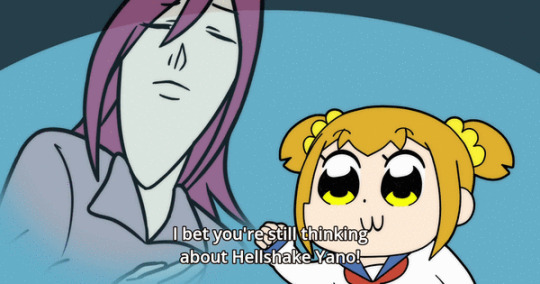
- Green Touga Saionji is a bitch-ass motherfucker but like he at least tried more than anyone else so uh that's something I guess?????
Like the guy clearly has some unresolved feelings about Touga so i'm inclined to be sympathetic bc wow poor choice my dude but also... bitch-ass motherfucker
-Nanami really went through this thing for me where it's like... she's a brat and a shitty person but it's also hard to really dislike her bc she does get what she deserves most of the time and also she gets kinkshamed more than most of the cast despite none of them really having a high ground over her lol

-Miki did nothing wrong (aside from like the implied incest but that's also like... half the relationships in this show uh)
sidenote I can completely see the notable excess of Incest Subtext/Maintext being intended as like... A Thing to comment on how common it is within shoujo and also tying in to like the bigger themes of Growing Up bc the idea that you’re chasing after your own damn siblings betrays some freudian inability to mature or whatever but tbqh it doesn’t always feel like the show knows the line between commenting on this and indulging in it and RGU is very indulgent by its own nature so I really can’t blame people put off by the show as a whole bc this is an area where RGU is largely indistinguishable from its genre peers
-Juri really did nothing wrong tho also props for having the best duels
-FUCK SHIORI THO for eel
so obviously i have not seen the show up to now but I've been in yuri circles for a long time so I knew about Juri/Shiori and my perception of it had always been "oh it's one of those kinda messy with complicated feelings" kinda ships where the drama is a big part of the appeal and that's true but like
the actual nature of it I did not realize up to now and OH SHIORI'S REALLY THAT BITCH HUH
So not only does she date that one anonymous guy specifically to spite Juri unaware she doesn't actually like him BUT THEN WHEN THEY GET REUNITED SHE'S JUST LIKE LOL IT DIDNT MATTER BUT HEY WE COOL RIGHT *AND THEN* when she finds out about Juri's feelings she's like HELL YEA I CAN HANG THIS OVER HER HEAD FOREVER FUCK HER
***AND THEN*** when she gets some karma after Ruka dumps her ass she airs her dirty laundry out in front of EVERYBODY like Juri hasn't been dealing with this shit like an absolute champ the whole time like?????
Like ok i get that there's the sad longing drama there and usually that's my jam and the show itself seems to end on kind of an ambiguous note and the follow-up manga from this year seems to leave it as kind of a "maybe" but I'm sorry get Juri a better GF 2020 she deserves better
I saw some Juri/Wakaba going through the tumblr tag for the show and honestly that's some big brain shit I'm here for it
Also now knowing exactly how this dynamic operates it really makes that Jasper/Lapis reference pic one of the SU crew drew of them read very.... interestingly???????? (tho Lapis' design reads a lot closer to Kozue and that's probably a closer personality analogue too)


-I love that thing in ep 37 where the whole SC is just very casually like hey utena if the whole revolutionizing the world thing with anthy doesn't work out uhhh call me im free haha just kidding unless...? lmao
-I'm pretty uninclined to try to pin precise sexuality HCs to characters for series this old where the ambiguity is part of how its danced around like partly coming from my own experience I'm inclined to read Utena as bi but that really is just coming from me?
But on the other hand literally every time a guy is like "i love you utena come be happy with me and we can love each other forever" she's like "k" after having left them on read for a day and disconnects from them entirely so lesbian going through comphet is a pretty valid read i think lol
-Lastly I think it’s pretty interesting but validly frustrating how fast and loose the show’s relationship with dream logic and non-traditional storytelling really is like when the shadow girls show up I was like “oh this is a greek chorus thing and it’s meant to reflect on the themes of the episode” (or uh in the case of exactly Ep 29 to break from tradition and explicitly tell us what a characters deal is lmao) but then no actually turns out they’re actually real characters who exist within the show too fuck you
ANYWAY I really did love this show and felt like I got a lot out of it despite it being pretty infamously hard to decipher but the ways it's inscrutable appeal to me specifically so very happy with this I'm gonna be thinking about it for a while
#revolutionary girl utena#cw: rape mention#cw: incest mention#might follow up with some thoughts about the movie later
18 notes
·
View notes
Text
Thoughts on Revolutionary Girl Utena
So, as a first step in my ongoing effort to detox from 800 episodes of card games and expand my anime horizons a little, I've spent the last month or so watching Utena. Wow, what a cool and fascinating series! It honestly felt to me like a really strikingly bold and subversive show even by today's standards, let alone for the time it was made. Having had some time to think on it, here are some tentative thoughts:
While I definitely enjoyed and felt engaged with this show the whole way through, I think the last few episodes were what really pulled it all together for me. Up to that point, I absolutely loved Utena and Anthy as characters and their relationship, and found the general surreal presentation and aesthetics of the show really consistently beautiful and intriguing in a way that made it always feel engaging to watch, but it also felt like a kind of episodic and disjointed show where the various characters' stories didn't really seem to connect with or impact each other in any meaningful way.
But the endgame of the series was where it really took me by surprise in how it went so far beyond what I would have expected! The way the show had been framed up until then, I was basically expecting the big finale to be about Utena definitively making the choice to be Anthy's "prince" and rejecting the role of the "princess" that Akio wanted to push on her - and I would still have really appreciated and admired the show even for that alone, for Utena's gender non-conforming presentation and relationship with Anthy being portrayed so positively in general and for the way her feeling pressured to be more like a "normal girl" was always so explicitly framed as the "wrong choice" by the narrative - but I felt like the show really took things a step further in not just upholding Utena's role as the prince but outright rejecting the prince/princess framework and the hierarchy of the dueling game system altogether. It felt like such a daring ending to me in the way it totally breaks down and reframes the whole premise of the series up to that point, and made me look at a lot of the characters and themes of the series in a whole new light! It honestly made me realise that I'd probably been projecting my expectations of this kind of story on Anthy in much the same way as Utena had, and it made the show end up feeling really intelligent and insightful to me in its willingness not just to overturn gender role expectations on traditional romantic narratives and flip the bird to heteronormativity (which it still absolutely does, and does very well), but also to really question and criticise the assumptions behind those narratives on a fundamental level.
And the more I think about the series since then, the more I feel like so much of the series' broader imagery and themes really clicks for me in that light? The whole system of dueling over the Rose Bride feels like a very apt metaphor for the way so much of mainstream society and media does present romantic love, as a struggle to "win" your ideal partner as proof of your self-worth and as a magic cure for all your personal unhappiness and insecurities, as a sort of contest where the “losers” who can’t “get” a partner look up at the “winners” with envy and resentment - and the way Akio ultimately pulls back the curtain on that system to reveal that the ideal castle that all those people were fighting to reach was just a false image he was projecting to them to serve his own ends, that their attempts to escape their insecurities and "revolutionise the world" through winning the duels were really just upholding and reinforcing the status quo, felt really powerful to me. While I was watching the show, a lot of the side characters and their subplots had sort of frustrated me at times with their frequent emphasis on unrequited love stories that felt really obviously shallow and unhealthy, but I felt like the last few episodes really successfully reframed a lot of that to me as a remarkably perceptive commentary on just how much those kinds of empty romantic ideals and societal conventions can constrain people and warp their individual potential on a systematic scale.
In that sense, I feel like I can really appreciate the show's portrayal of how even fundamentally decent people like Miki and Saionji can be warped by the system into people willing to objectify Anthy and fight to possess her as a way of alleviating their own insecurities, even when they wouldn't have been naturally inclined to be that kind of person, through the pressure of the people around them accepting it as the norm and the false promise of the ideal happiness waiting on the other side. How people like Wakaba and Keiko can be made to believe that happiness is impossible for them and to resent the people around them for "stealing their happiness away", because everything around them has led them to the subconscious belief that the only "happiness" out there is being noticed by a popular guy like Touga or Saionji. Even Utena, the one who most explicitly rejects the dueling system and specifically sets out to treat Anthy as a real person with her own autonomy, still ends up unconsciously projecting her own ideals on her and playing into the established system in the ways she goes about being her "prince", because the influence of those flawed ideals and norms is so deep and pervasive that it's almost impossible not to internalise some of it.
It feels like something I can definitely relate to as someone who absolutely did buy into a lot of that crap as a teenager and seriously hurt other people as a result - and while I did eventually manage to break out and see the toxicity of the system for what it was, it's also horribly easy for me to see how easy it must be for people to stay constrained by it and live out their whole lives without "breaking the world's shell", without even realising how the toxic assumptions they've inherited from "the world" are killing them and distorting the ways they interact with other people - how their attempts at escaping from their insecurities are hurting themselves and others, and ultimately just perpetuating the same system that's strangling them. Akio is a horrifying villain because the ways he insidiously manipulates and influences the people around him feel absolutely real - he's able to play to people's vulnerabilities and unexamined assumptions, to make them follow along with his script while keeping them always genuinely believing that they're making their own independent decisions and fighting for their own happiness and fulfilment. It's very hard to fight something that embeds itself on such a deep and unconscious level in people's basic assumptions and frameworks for viewing themselves and the world, where people don’t even see the ways it’s influencing them.
But I think Utena's ending feels very honest and hopeful in acknowledging that, while the system can't really be defeated or destroyed by individual people in any meaningful way, what people CAN do is make the decision to step outside it and not allow it to have power over them - and, hopefully, to inspire other people to be able to make that choice for themselves too. That part towards the end of the film where the other student council members came to the rescue and helped Utena and Anthy escape, wishing them well in the outside world - "We still haven't found our own way out yet, but we'll definitely get there some day" - honestly made me tear up a little! It really communicated a strong sense of hope to me in the idea that these kids might have made a lot of mistakes and still have a lot of growing up to do, but it's still possible for them to break free from Ohtori and everything it represents the same way Utena and Anthy did - that the present doesn't have to keep following the way of the past. It’s still possible for the next generation to escape it and leave it behind. The whole imagery around the film's ending - "it may be a world without roads, but we can build them" - felt really uplifting and beautiful to me as well; as ridiculously bizarre and surreal as the film was in a lot of ways, it felt like it capped off the series' themes really nicely.
All in all, I ended up feeling really fulfilled and satisfied with this show! It feels like a very deliberate series that's extremely conscious of everything it wants to do, and generally executes it well. I would say I probably didn’t really connect with a lot of the individual character arcs on a particularly deep level - Juri's resolution with that one guy who popped in completely out of nowhere felt particularly odd to me, and I wasn't a huge fan of Nanami or Touga either - but I think it really nailed the bigger picture in terms of its thematic project and the ideas it wanted to convey, and on the whole I feel like I just have a huge amount of respect for the things it had to say and the way it went about saying them. The whole imagery of the setting with the school as an isolated, self-contained world with its inhabitants unknowingly being overseen and controlled by Akio from his tower as "the highest place in this world" really feels like such a strong and vivid metaphor to me, and I honestly felt really impressed with just how perceptively and accurately the show manages to portray the subtleties of the various ways social and patriarchal pressures really do operate on people (and on young teenagers who are still figuring out how love and relationships work in particular). It's weird to say about such a surreal and often goofy series, but I honestly feel like I haven't seen a story that approaches those kinds of subjects with this kind of clarity, and I feel like this show's framework has honestly helped me to reexamine and better understand a lot of my own messy teenage experiences as well. Definitely a show whose whole feels like more than the sum of its parts for me, I think, and one that I expect is going to stick with me for quite some time!
103 notes
·
View notes
Text
Mismatched Bodies
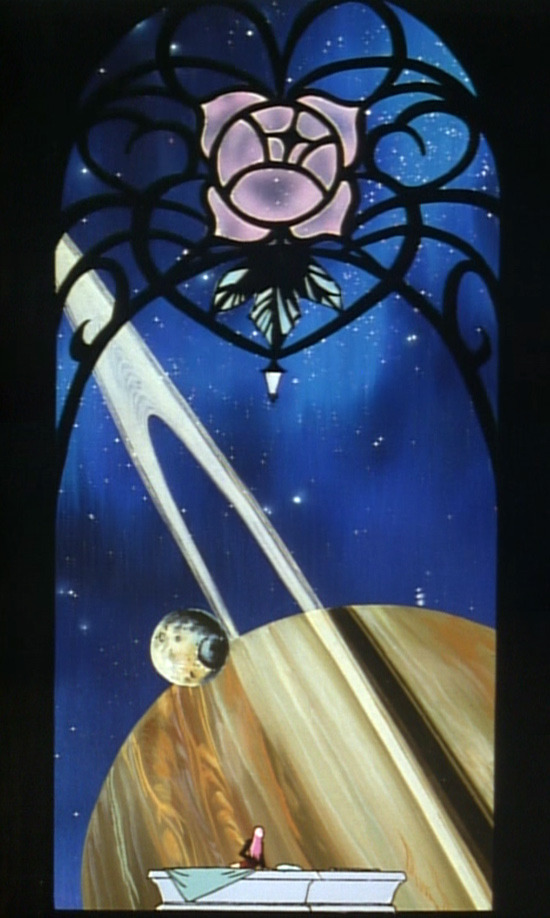
- Episode 36, And the Gates of Night Open
Utena: I probably wouldn't understand since I don't have any siblings myself,
Utena: ...but what does it mean for a girl to have an older brother?
Utena: What's this?
Utena: The moon?
Akio: Normally, it's something useless and of little concern.
Akio: But, every now and then, you look up at it and feel a certain degree of comfort.
- Episode 14, A Landscape Framed by Kozue
Moons in Revolutionary Girl Utena serve two purposes, hinted broadly at by this dialogue that occurs very shortly after space becomes a major motif in the story. The full moon comes to represent both sibling relationships, and the comfort and closeness of relationships, sometimes sibling ones, and sometimes not.
A full moon appears outside the window as Miki plays his piano, it looms large in the sky outside Nanami’s window just as she learns her brother is not actually her brother, and two moons consume the sky outside Utena’s window in episode 30, the larger eclipsing the smaller, as her loyalties become split between the siblings she cares about.
These are all quite evidently Earth’s moon, even the two that appear in episode 30 look far more like it than any others. However, just as events in the story reach a head, we get this very strange window. A moon above a massive planet, dominating the scene with its rings spanning across. Why?
The planet is Jupiter. Jupiter does have rings, but they are not nearly so visible as Saturn’s; the characteristic counter-rotating storm bands drawn on this planet are very much Jupiter’s, and they are what gives it away. Saturn also has this atmospheric feature, but the bands are significantly lighter and appear more as streaky blurs in a true color image. The difference is significant enough I think to say this planet is supposed to be Jupiter, whether they mean to refer to Jupiter’s bands or are depicting Saturn’s bands. Why the confusion?
Let’s talk about the moon. It has a very, very distinguishing feature to set it apart from all others, one that makes their drawing it very deliberate: a single massive crater site that makes it look like the Death Star. This is Mimas, the smallest known astronomical body to maintain a spherical shape based on its own gravity, ironically named after a Gigantes of Greek mythology. (These are the giants that the Olympian gods battle it out with early in the mythological history.)
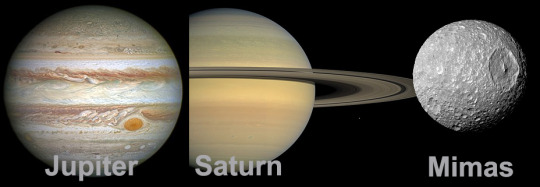
Mimas, however, is a moon of Saturn.
So what we’re given here is a moon and a planet mismatched, dominating the sky outside Utena’s room just as Touga arrives, asking her to accompany him. He takes her then to the duel arena at night, where he confesses he loves her, and asks if those feelings really must remain unrequited:
Touga: Is there no way I can be your Prince? You're my only princess.
Utena: Not that again.
Touga: It's true. I love you. From my heart, I treasure you. Your nobility and beauty shine on many.
Touga: And even if I'm not worthy of you, please, be with me for at least this instant. Just that will do. If I can just carve the memory of this night, the two of us together, within me, that will be enough. Will you permit me that much?
Utena: I understand.
Touga: Thank you.
When it is clear to him they will not be, he asks if he can have at least this one intimate moment to himself, and she grants him this mercy. (This is an interesting development for Utena, who I think would not have answered the same way before now, and it shows how much she has grown since earlier episodes.)
In this moment, both Touga and Utena are seeking comforts. Touga wants the comfort of intimacy with this girl he’s become obsessed with, whether he truly loves her or not. Utena has come with him because he says he will tell her about Ends of the World, and she believes this information would comfort her to know, as it would help her protect Anthy. As viewers, we can note how in neither case would these things bring them any comfort: Touga would not be comforted to have what he admires for rejecting him, and Utena is not going to sleep better at night knowing who Ends of the World is. But it ultimately doesn’t matter, because neither gets this comfort they want anyway.
The sky in the window and the moment in the arena speak to the same thing: the ill-fated connection between these two people. Though Akio can put a moon in the wrong place, for a moment, in the end, these bodies do not belong together. Touga may be able to capture a moment of intimacy for himself in the arena that night, but he does not belong with Utena, any more than this moon belongs in this orbit. Everything here is wrong: the wrong planet, the wrong moon, the wrong place, the wrong time, the wrong people.
Though I do not think this is necessary to the comparison, it would seem most likely that Utena is Jupiter, and Touga is Mimas. If only because Touga is, at this point, the more pointed comparison to Mimas: a small thing made larger by its name, orbiting the wrong planet. This is definitely the comparison Akio would find most amusing to make, and I tend to assume anything we see in the sky is an extension of Akio’s thoughts and will, given the nature of the projector as explicitly how he creates the world we see. But even if it were not, the point remains the same.
In a window used throughout the final stretch of the series to illustrate and expand on points in the story, we are given here, before Touga’s final duel, these mismatched bodies. They dominate the sky, consuming the view through the window, because they are only bodies left of any significance now that the dueling game is drawing to a close. One is the largest body in our solar system, and in orbit around it is the other, far smaller and less significant than its name would suggest. And though these bodies are all that is left in the sky for us to see, they are mismatched, one fundamentally unable to belong to the other.
Utena and Touga share a strange, confrontational intimacy. Touga is drawn, perhaps to love, to this strange girl that snubbed him, that was able to get around all his most carefully woven nets, and Utena will never forget that he was, for a moment, her Prince. She asks him during the duel to come how many times they have fought, and when he tells her as a lingering touch breaks, she wonders why it feels like so many more. They have always been at odds, unable to understand or connect to one another, so much so that they do not even belong in the same orbit of the solar system. They were simply, it seems, never meant to be.
#utena#revolutionary girl utena#touga#utena tenjou#touga kiryuu#sku#rgu#meta#spaaaaace#shoujo kakumei utena#utena meta#utena analysis
266 notes
·
View notes
Text
Black Roses as the Mob
There are four roles in the Tale of the Rose as we’re told it. The princesses drive the action by needing to be rescued but are so passive they don’t do anything themselves — or even appear. Dios is the Prince and Anthy becomes the Witch. But there is also the Mob.
The Mob is, at least in its pure, fairytale form, composed of men who are not princes (although there does appear to be at least one woman present). They idolise the Prince, believing he can do what they cannot, and because they believe this they also believe they are entitled to him doing it. As soon as he refuses, even if only because he’s unable to provide, they turn on him. Or, as it happens, on Anthy, who steps up to take the blame for why he can’t meet their demands.
I think there’s a reason the swords drawn by Black Rose Duelists have black hilts, like the Swords of Hate do.
A potential Black Rose perceives a person as special in a way they can’t see themselves. They attach themselves to that person, idolise them, and often help them in some way.
When the special person fails to deliver on what the Black Rose expected and felt they were owed, they become angry and turn on them, aided by Mikage who pushes them to act on their darkest feelings.
*
Kanae is, by personality and inclination, a princess. But Akio won’t make her a princess, constantly ignoring and rejecting her attempts at affection. Kanae fears he prefers his sister, although she’s probably unaware of the way in which that’s true, and blames Anthy for encouraging his coldness by not treating her as family. The things she refuses to see in Akio — the contempt for her and strange, almost inhuman, behaviour — she sees in Anthy and only in Anthy. Anthy becomes the Witch and the Witch must die.
*
Kozue feels that Miki was valued for his specialness, his talent, and that she was only ever valued when she could fake it. Even Miki fixates on how good her playing was in his desire to have her back making the real, non-special, person she is only capable of disappointing him. The unhealthy ways in which she tries to get his attention, the lie she lets him keep believing for fear it would break the bond between them completely if she corrected him, all of it becomes something she can blame on Anthy. It’s only because Miki has someone new to fixate on, not the underlying issues between them, that are pulling him away. If she can just get rid of Anthy everything will be fine.
*
Shiori’s lived her life in Juri’s shadow, unaware that she’s been on a pedestal for Juri the whole time. She knew, I think, that it wasn’t a friendship. She and Juri had nothing in common. It seemed like it must be pity that bound them, that brought Juri to pay attention to her, and finding out it was attraction doesn’t mend things. Shiori seems to blame Anthy the least. She still tries to kill her, but without much purpose to it. Drawing Juri’s sword seems to be more the purpose for her, a bitter, vengeful drawing, to take a part of Juri against Juri’s will.
In that way perhaps she’s more like Anthy than most of them. And Shiori wants to lash out at herself most of all.
*
Mitsuru is impatient. It’s not that he believes he’s lesser, that he’s inherently not special. It’s that he’s not special yet. Like all children he has little control over his own life and there are a lot of things he’s shut out of or doesn’t understand. Perhaps he could wait to grow into specialness, if Nanami wasn’t already ahead of him, if she wouldn’t always be ahead of him. It’s not so much Anthy herself he blames as “adults”. And, just as he sees Nanami as already adult, he includes Anthy in their number.
*
Wakaba is a sweet girl, drawn to those who are special in hopes that supporting them will let a little of that rub off on her. Utena is almost more her problem than Saionji. Utena’s a well meaning friend, but one who often leaves her overshadowed, or takes her for granted. Reaching out for someone special has the potential to make her special too, and Saionji needs her. Then he gives the present he’d promised her to Anthy, giving her good reason to think Anthy’s the one coming between them. Anthy becomes a lightning rod for all the times the special people have taken things Wakaba wanted without even noticing.
*
Keiko wants Touga. This is not, in itself, a difficult thing to have. Touga’s not there to save all the girls of the world, but he is constantly available to them. Keiko wants more than that, though. She tries to get closer to him through his sister, only to find that Nanami blocks anyone from getting close to Touga and ultimately takes revenge on Keiko for even trying.
Nanami throws off the pattern a little. Anthy is meant to take the blame, but Keiko seems confused about why she wants to hurt Anthy and gets distracted by the desire to hurt Nanami even as she duels. She has more actual reason to blame Nanami, who genuinely has hurt her, but also Nanami is her Prince’s little sister who tries to keep him from all the girls of the world.
Unlike the other Duelists, Touga brings his own Witch into the game.
35 notes
·
View notes
Text
@palaceperspective had the idea that someone could make a post about just the snippets we see in the series of Touga’s and Nanami’s childhood. I think that’s a really neat idea. I was going to make this part of the general post on Touga I’m making, but I think that’s long enough as it is; I’ll just include a link to this post in that one.
I tried, at first, to leave creator commentary out until the very end, because I know some people prefer to reject certain parts of it regarding the Kiryuus’ past; however, I couldn’t do this because.it simply makes too much of a difference regarding the flashbacks in episode 10. Still, there’s a lot in the scenes that stands regardless of that, which I talk about plenty.
The specific piece of commentary I’m thinking of is this bit from Yoji Enokido, scriptwriter and planner for the series and movie. Aspects of the movie are discussed in there, so do expect discussion of childhood sexual abuse.

Touga’s birthday cake has 12 candles, so it’s likely, though not certain, that this was his twelfth birthday. It’s very obvious that this household is very rich and decadent: No surprise. I don’t know what kind of flowers those are; I wonder if they have any special meaning. It probably doesn’t represent his birthday: His birthday is June 6. The birth flowers for that month are the rose and honeysuckle; this I find in English-language and Japanese sites alike. Japanese Wikipedia also lists birth flowers for each individual day of the year (pretty cool); June 4 corresponds to the evening primrose (Oenethera), the ice plant (Lampranthus), and pink baby’s breath (Gypsophila). This doesn’t look like any of those.


Touga is sitting on what looks like a throne, but he seems to be on display for the guests (all adults) more than anything else. They’re peering at him like a museum display or an animal in a cage. One of them holds a bouquet of white roses, which generally represent innocence and purity... also, according to one site I’m looking at, “new beginnings.”
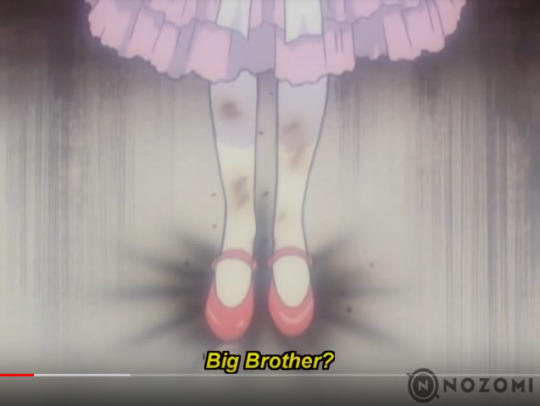

Nanami arrives at Touga’s party late and covered in dirt.

No comment that she’s late, only that she’s dirty. No one cares that she was missing... which, in hindsight, makes a lot of sense, because a child with much adult supervision surely won’t find an opportunity to drown a kitten.
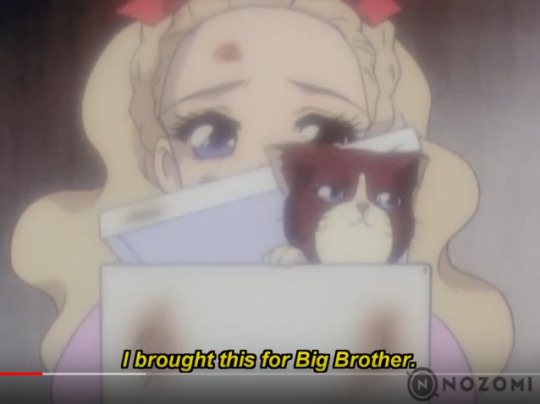

I really don’t know how I haven’t thought about this before, but Nanami just says she “brought” this kitten. I have very little doubt at this point she spent a good portion of the day running around the no doubt extensive estate grounds trying to capture a kitten.
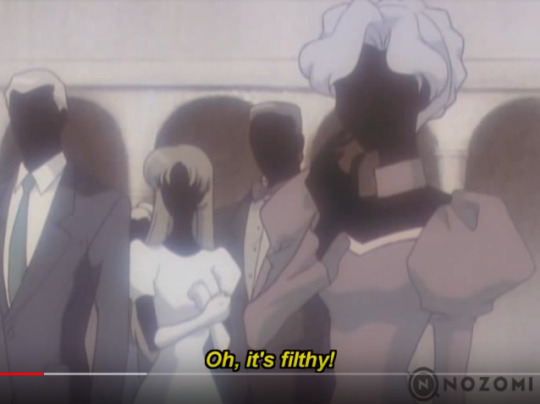


I’m not sure what to think about Nanami calling this woman Mama. I figured these were all strangers or servants, since they were saying “Touga-sama” and “Nanami-sama.” Touga still has short hair, so they’re still living with their original parents. I wouldn’t expect Nanami to have any memories or photos from that time, but it seems she does, just not going back far. But all of the adults here are faceless, none singled out. I’m not sure if the original parents are here, or if she just... assumes that the servants who have interacted the most must be her mother and father, and they never corrected her. Either way, she ended up forgetting them.
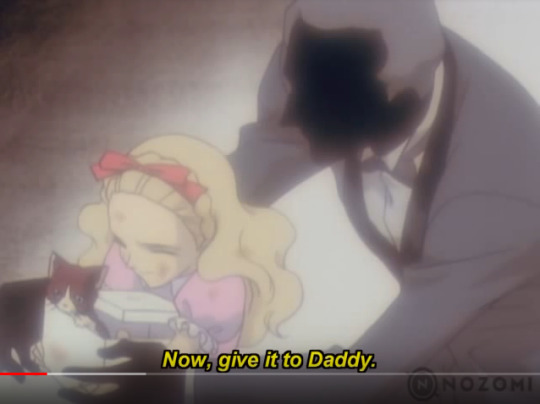
I want to note that not only are all the adults in Nanami’s memory are faceless silhouettes, they only interact with her to scold her and take away things that are precious to her and that she worked hard for. I think that’s probably how it was for her, growing up.

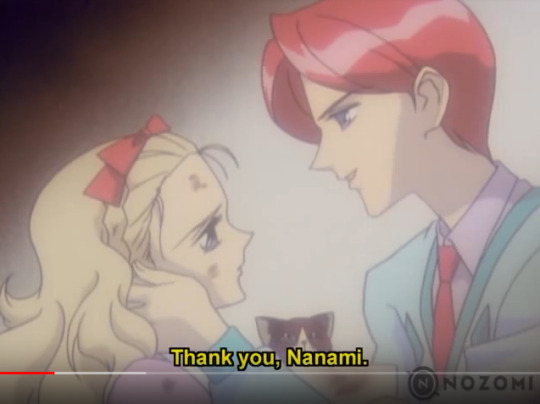

I think he’s in earnest here. It makes sense that he’d be pleased by Nanami’s gift, seeing as she’s the only one who was actually trying to make him happy... it showed that someone, at least, cared. Given how extremely weird and creepy this party is, it seems like... maybe it was an auction. Except, it must not have resulted in anything, if it was his birth parents who originally forced him to grow his hair long... maybe Nanami arriving late, covered in dirt, and carrying a stray kitten in a box had something to do with that. In which case... No wonder Touga’s happy about it.

"His smile was something for me alone.” You know what, I can believe that.
Similarly, his annoyance with Nanami, when he yells at her to leave him alone, also seems genuine.
It makes sense that, even before Touga begins deliberately manipulating Nanami, she would develop an unhealthy obsession with obtaining his affection, because based on what we see in this, she probably has no other source of affection in her life.
It also makes sense to me that this might grow really frustrating for someone who is constantly being made into a spectacle and showered in invasive attention (and according to what Enokido said, that’s just the beginning).
Ikuhara’s commentary for this episode really hits home when the scene is given a close examination:
When I was a child, the center of the party always seemed to sparkle.
I was always standing on the sidelines, gazing at that sparkle from afar. I thought the sidelines were my place. Surely I could never approach the center of the room.
But then, I was chosen! I touched that sparkle in the center of the room, and no mistake. Still, I know full well that it’s something that won’t last forever.
The day the contract ends, I’ll turn into an “unchosen girl.”
So I’ll go back to the sidelines again, eh?
--Smash the egg’s shell.
For the revolution of the world.
“The center of the party” was/is both figuratively and literally where all the worst things are happening, and Nanami, without knowing it, is striving to get there, next to Touga, before anyone else can take that place by his side, and that’s what her whole story is about.
I’m just going to say, on that note... it’s super messed up to read "in order to protect his younger sister, Touga accepted his lot” and then think about the fact that he ended up using her as a pawn anyway, was already at that point by the beginning of the series, and ended up actually sexually assaulting her in episode 32. Just. Nice going. Ugh.
The other major flashback we have is from episode 9. It seems to be slightly later.
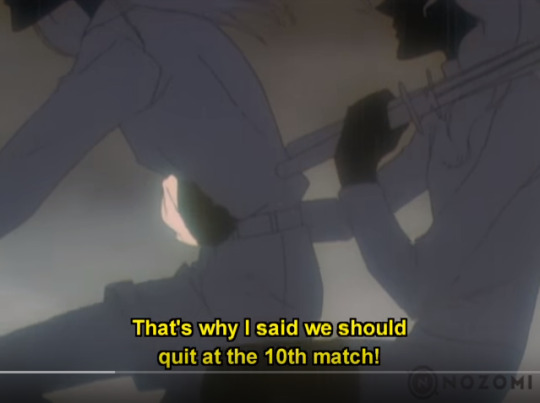
"See, it’s pouring down! That’s why I told you we should have quit after the tenth match!”
“I couldn’t help it. You’re the only one I know who’ll let me practice on them.”
And here we see the beginning of Touga’s habit of making excuses for everything he does... no. I don’t think this means anything; it seems innocent enough. This Touga has grown his hair out, and he has a friend, Saionji. They appear to be very close.
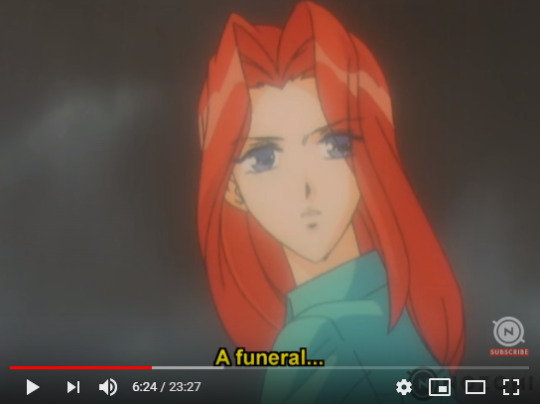
His reaction to hearing the funeral bells is interesting, though. He looks very interested and not at all disturbed.
Touga says nothing when some adults come by to ask about a missing girl whose parents have just died. When Saionji keeps talking afterward, Touga doesn’t respond but is looking into the distance very intently.
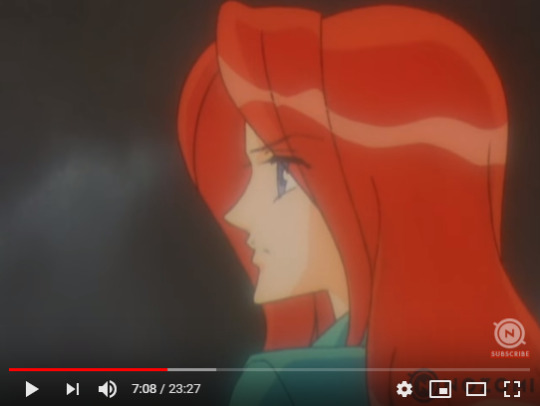
When Saionji brings him back to reality, he starts walking towards the church they had passed earlier. He explains to Saionji that he thought he saw three coffins there before. Generally I think the assumption then would be “someone else died too,” but Touga is led here by the story of the missing girl. He strides over to the coffins very quickly and immediately starts opening one, despite Saionji’s protests. Sure enough, a voice is heard telling him not to open it, but he doesn’t anyway. The next part is interesting: he tells her that people are looking for her, and she asks if he’s going to tell them where she is.

I don’t think I’ve seen any analysis of this scene other than “Even as a kid Touga thought nothing of fondling this complete stranger’s hair.” Which is an interesting point and brings up the question of where he learned this from. But I think it’s equally interesting that he was just going to leave her to die and that this, to him, is “being an ally to girls.” Being “feminist,” even though I’ve read that in 1990′s Japan it was common for that term to be misused.
...It occurs to me that this is actually very different from how he treats girls later: well-intentioned and absolutely wrong, but in pretty much the opposite way from how he treated Utena later at the end when again he claimed to be looking out for her. That Touga tried to take control of her in order to “save” her. This Touga basically goes, “Well, if this seven-year-old wants to die, we should let her, because that’s her choice.”
The camera pans back to him when she says that living on just makes her sick.

The next pan to Touga happens when she says, “I’ll never come out into the sunlight again.”

Saionji thought that Touga must have shown her something eternal so that she was motivated to keep living on. In reality, Touga didn’t have anything to offer her. I have a feeling he suspected he was right. But clearly, he wasn’t that far gone yet; he wasn’t at the point of stopping everything, of no longer going through the motions of life. But it seems like he could get there. So why didn’t he? What changed? It turns out Ikuhara wrote about this in his commentary on this episode:
When he was young, he met a girl. She said things like “Everyone is alone” and “There’s no such thing as eternity.” A deep despair: He couldn’t save the girl. But the next day, there she was in the sunlight, with “something different in her eyes.”
Something had saved her.
He wanted to know the true nature of the “miraculous power” that had done it.
When he met her again, he tried to “rule” her heart. His thinking was that only “the joy of being ruled” could save people. He believed that was wherer the “power of miracles” dwelled.”
I think that says a lot about Touga. It probably took some time to get there, though.
The new manga is, of course a different continuity, but I want to take a moment o cover it because it explores how the scene might have gone if Touga and Saionji had found Utena just a bit later. The subtext of Touga feeling that the girl in the coffin is perhaps right is made explicit in this.
Utena: Living on makes me sick.
Touga: You’re right. Life is so unreliable.
He says that outright. And I think that anime Touga was likely thinking it. So when this Utena says she’s decided to live on, Touga is surprised.

He hangs onto every word she says and seems especially moved by the phrase “revolutionize the world.”
Back to the anime. The anime doesn’t have any more scenes from the Kiryuus’ past, but of course we get some insight in episode 37. I’ll start at the beginning: Nanami says that the two of them used to share everything. There are some pictures we see to represent that:
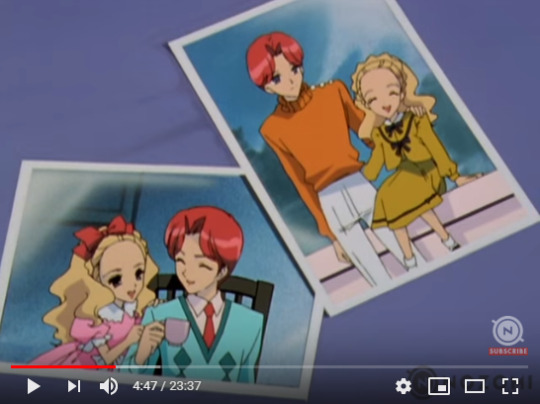

“But now Big Brother doesn’t care about me at all.”
I’m going to use the empty movement gallery for the next couple of screenshots because these photos went by v. fast:
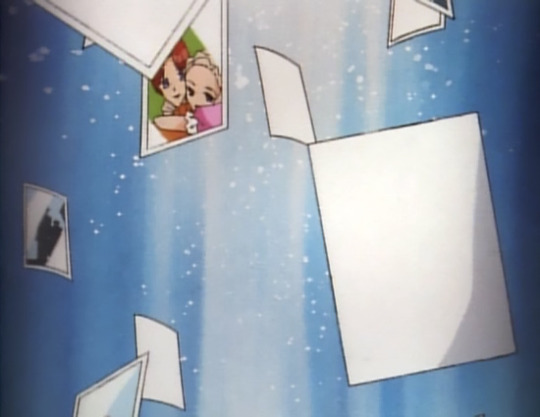

As you can see, these are all Short-Haired Touga... also, none of these seem to be much older than that flashback of Nanami’s.
We catch some more glimpses when Nanami notices the lack of photos from Touga’s early childhood and is desperately rifling through all her pictures with him.

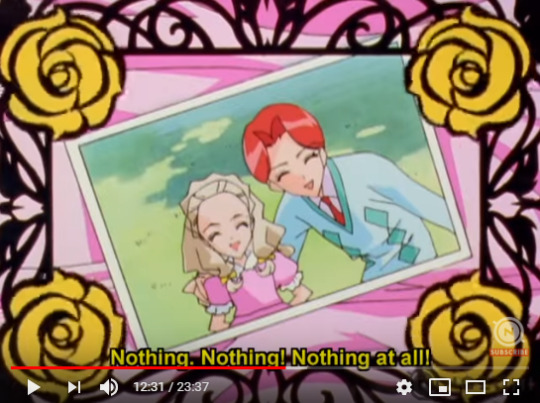
I would comment on the fact that we never see him in the regular (non Stu-Co) Ohtori uniform in these, but then, Nanami isn’t wearing the normal uniform in any of these either, and we know she used to be a normal student... so I think it’s just because we don’t get to see all of the photos.
71 notes
·
View notes
Text
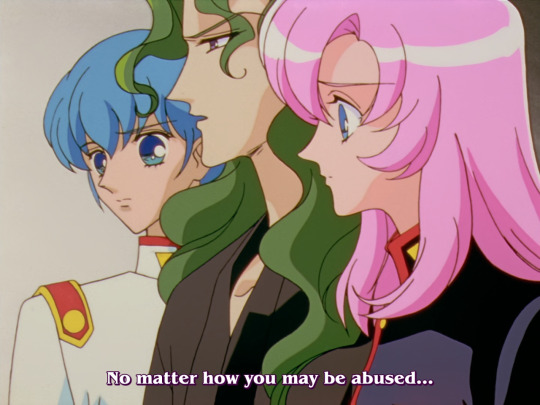


yet another moment where saionji says something incredibly trenchant and insightful only to be completely dismissed due to the ridiculous framing and the general cringiness that pervades everything he says and does (eg, pointing out that the castle is a trick of the light, announcing that they must shed the coffins end of the world has prepared for them, etc etc). obviously in this instance, he is both saying something that is proven correct throughout the show via a myriad of dynamics, but is also shown to be a precept that is teleologically challenged and rejected by anthy’s final choice.
upon a first viewing, one might assume saionji himself is talking about anthy here, whether by presumptuously assuming that she loves him despite his abuse, or claiming that her rejection of him does not lessen his love for her. either way, he seems totally delusional and moronic. i can only assume that utena, who has even less information than we do regarding saionji’s true feelings, assumes that he is talking about anthy, and thus dismisses him out of hand for being a violent idiot. and rightfully so. but also, he’s clearly not talking about anthy, even if he may think he is (or at least would claim that he was if questioned). and this statement is truly definitional to his relationship to touga, whom he resents, envies, and maybe even loathes, but whom he cannot seem to ever actually abandon.
even when he’s given the chance to start fresh, he returns to ohtori (and in this case you can say that it’s because he has nowhere to go, no family, the outside world is scary, ohtori is all he knows, he felt he had no other choice… but this was also true of anthy, and she eventually found the courage to leave! it’s very very hard, but it’s not impossible, which is the point). even as he vocally condemns akio’s system, he nonetheless participates in it, albeit reluctantly, for touga. he is freer, healthier, and kinder in wakaba’s dorm, but he is also deeply unhappy. which isn’t to say that he ever seems happy (at least, not after losing the rose bride), but his unhappiness in “wakaba flourishing” is that of depression, whereas his unhappiness around touga is that of resentment. he’s rightfully angry over constantly being mistreated, but at least he’s not lost. he has a purpose. even if it’s just the purpose of receiving abuse and putting up a futile fight, it’s a role he can play with the only person who has ever truly mattered to him. it’s all he knows; it’s the closest thing he has to real love. and so he stays.
nanami is in a very similar situation as saionji is. they both idealize a version of touga who never really existed, and cling to him despite his blatant mistreatment of them because he is the only person who has ever shown them true affection in their entire lives. he manipulates them, makes a laughingstock of them, facilitates and participates in sexually abusing them, but also makes sure that they are too dependent on him to leave them. nanami is even more blatant in illustrating this idea than saionji is, as for most of the show, she does not even resist against touga like saionji does, rather she purely venerates and worships him, to the point of parody. he is a terrible brother to her, but in such a way that makes it seem like he’s actually a good brother to an obnoxious, ridiculous sister. he is actively grooming her, and she has nowhere to run, because he has fashioned himself her entire world. she cannot fathom a world beyond his limits, her very own personal end of the world.
it’s somewhat unclear whether touga thinks that controlling saionji and nanami is necessary to keeping them around, or whether he only wants them around because he enjoys assuming control over others. it’s probably a mix of both. he probably does hold some affection for them, but cannot conceive of a way to keep them as close to him as he would like without exploiting them, because he believes that true friendship is for fools and true love is impossible. to touga, if every relationship must be imbalanced in some way, then he at least wants to be the one with the power in his deepest relationships, unaware (or at least, willfully ignorant) of the fact that by corrupting and perverting their dynamics, he is slowly tainting their naive childhood love and affection that drew them to him in the first place. so in touga’s case, he inverts saionji’s logic to refigure it as “love can only be facilitated through abuse, no one will truly show you love unless they have to (through exploitation).” it’s the logic of someone who sees the world through an almost 2D framework of abuse, exploitation, transaction, and control. it’s the logic of someone desperately sad and desperately cynical. nanami is very wise (and brave) to ultimately reject him/it, even though it, too, is all she knows.
tsuwabuki complicates the nanami/touga dynamic by aspiring to inhabit both their roles simultaneously, and so he allows himself to be subjected to nanami’s exploitation while simultaneously subjecting her to violence. he is happy to be abused by nanami not because he loves her per se, but because their abuse is mutual. shiori and juri have a similar dynamic, wherein they are both at fault in different ways, both attempt to avoid the other (physically and psychologically) and yet constantly collide like magnets. however, the i would argue that the abuse they face is largely systemic, and their behaviors are primarily a symptom of their internalized homophobia rather than overt malice (even though shiori may pretend otherwise). miki and kozue’s tension is also mutual. they both harm the other despite loving them deeply. because love is not a bandaid that revolves all pain, misunderstanding, and miscommunication. see: the utena and anthy ledge scene.
finally, i think this quote is actually most powerful when figuring it through the lens of utena, anthy, and akio. of course, akio has fostered a dependency in anthy much like touga has with nanami, and so she does not know how to leave him despite being in incredible pain at his hand. but she is not “happy,” as saionji puts it. she is the most miserable girl in the world. she doesn’t love akio as much as she loves the memory of him, the idea of dios (which is of course also true for nanami and saionji re: touga, arguably also true for juri re: shiori, miki re: kozue, etc etc) — but anthy needs akio. or at least, akio has convinced her that she does. he is end of the world, she cannot envision a life beyond his imposed limits.
but i actually find it more interesting with regards to utena and akio. i don’t think at any point in the show, utena ever actually has real, romantic feelings for akio. i think that she is terrified of him, and in her desperate feelings of trapped helplessness as he ensnares her, she convinces herself that those heart palpitations, startled movements, shocks and thrills she feels in her presence is the emotional response not of fear, but of affection. but we know that in anthy’s presence, she doesn’t feel afraid, she feels calm, relaxed, happy. being with anthy isn’t wildly exciting, constantly requiring rationalizations to explain away the dread and internal rejection she feels towards akio’s advances. being with anthy feels like coming home. and it’s why she is initially so happy to be accepted into anthy’s family, to have a big brother like akio, to live under their roof. in utena’s naive, hopeful mind, she is joining anthy’s family in the most innocent possible sense. and she endures it, the grooming, the abuse, the rape, the end of the world; she fights til her very last breath, because she is in love. no matter how [utena] may be abused (by akio), she’s always happy to be near the one she loves (anthy).
#remind me to write an analysis on the moniker ‘end of the world’ next#bc i only rly allude to that here#id in alt text#u#analysis#manalysis#saionji#utena#touga#anthy#akio#nanami#miki#kozue#juri#shiori#tsuwabuki#dios#utenanthy
407 notes
·
View notes
Note
what if right after Bella touched down in Forks and met her dad, she got the personality of Utena Tenjou from Revolutionary Girl Utena? How would the story change, and would Bella-Utena be able to survive the Edward yandere simulator? (You can probably tell I just binge watched revolutionary girl Utena for the second time…)
Oh boy.
Well, first, I think we have to go over how Utena would even react to this.
Utena and the Real World
One of the things I love about Utena is that we have no idea what the real world or adulthood is. It's less magical, less beautiful, presumably than Ohtori Academy but it could also be a post apocolyptic wasteland due to Anthy's decision to have the prince stop sacrificing himself for them.
We never get to see it and I love the show for that.
It's a nebulous, terrifying, place that the characters know they must reach or else perish without ever having been born.
And then, of course, there's the fact that those who leave Ohtori don't seem to be able to take much with them just as those who enter Ohtori. What I'm getting at is that memories are a fuzzy thing in the Utena universe and characters very much shrug and go along with it.
Back to the Ask
For my sanity, we'll say that Utena has not entered Ohtori yet. She has not remembered why she wanted to become a prince, she is still searching for her prince unaware of who he is, and she hasn't been pierced by the swords in Anthy's stead.
Utena finds herself waking up on a plane and getting off. She's a little confused, but not overly much so, and figures she must be traveling somewhere, likely in search of the prince who she's been wanting to meet.
In the bathroom she notices her face looks different. Everything about her is different, she's older, her eyes are now brown along with her hair, and she's shorter too.
Utena's annoyed by this but doesn't think much of it as she didn't in canon when she body swapped with Anthy. Shit happens. Probably because of whatever curry she must have had on the plane.
My point is Utena takes being 'Bella' in stride though she likely corrects Charlie to 'Utena' and gets really really really weird about having parents of any kind as she is decidedly an orphan.
Also, she wants to be a prince.
Charlie doesn't say anything to that.
At school Bella immediately clocks the Cullens as the student council people of note but would not find them to be prince candidates. While she wiffle waffled on Touga being the prince or not when she was uncertain was when he acted like what Utena thought to be a prince, gallant, chivalrous, brave, and kind. When he was an ass she paid less mind to him. Akio happened to be what was left of the prince, which helped him out, and also oozed seductive evil charisma.
The Cullens are too standoffish, too snobby, and Edward later too hostile for Utena to have interest in them. After Biology, for all Edward wouldn't notice the first time, he gets the Saionji treatment.
(Not to mention, I'm sure, that Utena actually likes Jessica Stanley as someone very reminiscent of Wakaba, good intentioned if a bit of a loud mouth who focuses on the wrong guys for sometimes the wrong reasons. Utena would be appalled that Edward acted so cold to her when Jessica was being brave.)
When Edward returns and tries to be charming...
The thing is that Edward is ultimately pulling a Touga. He would find Bella (Utena's) desire to be a prince, to meet a prince, bemusing and later irritating (as Edward is certainly not that prince and knows it). More, he would want to be the prince, not her, in which case Utena would have to be put in her place as the rose bride er damsel in distress in the relationship.
Ultimately, because of this, Utena while perhaps wavering on Edward for a little bit would staunchly reject him when all of this makes itself clear.
Now, that said, Utena is beloved by the gods.
It's unclear what, exactly, the power of Dios is and when Utena started embodying it (was it only when Anthy noticed) but there's a chance that it could be there out in the real world and could keep her alive in any surreal confrontation with Edward (presuming this still is, in some way, the Utena universe).
This means that Utena will survive against all odds only to be pulled towards Ohtori to fight for the rose bride.
#twilight#twilight meta#twilight headcanon#twilight renaissance#the revolutionary girl utena#the revolutionary girl utena meta#the revolutionary girl utena headcanon#utena tenjou#bella swan#edward cullen#anti edward cullen#meta#headcanon#opinion
45 notes
·
View notes
Text
Rose Frames and Spinning Roses: Episode 31
Having to put the readmore at the top because the first picture this episode would be Nanami watching her brother in the shower: the RGU experience.
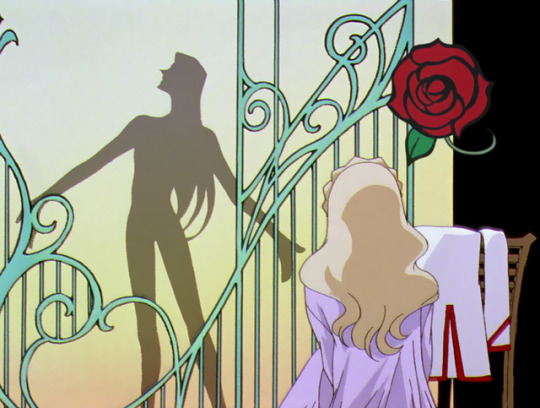
The red spinning rose of yeah, actually, you should not be watching your brother in the shower. It’s a very, very dark red, especially in comparison to the faded red Touga has had before, which might mean darker intentions. Or a deeper sense of wrongness, considering that Nanami has to be aware this is very, very wrong.
He knows she’s watching... but does she know he knows she’s watching?
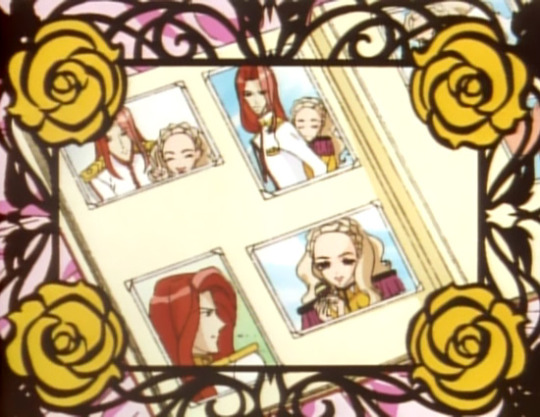


Nanami’s frames appear around the photos as she looks at them, because for the first time she’s aware of their falseness. This is her life, her story. She and Touga were perfect siblings, weren’t they? She’s always known everything about her brother, hasn’t she? How could she not have known he was adopted?

This rose is obviously still for Touga, but it’s a brighter, more vivid red. Is it the same as the one Akio got last episode?
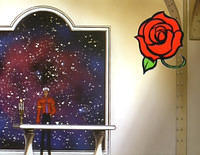
Yes, it is. But WHY? Touga getting it makes perfect sense, but why Akio?
Anyway, Nanami’s not so much reacting differently because he might not be her brother, I think, as because she’s questioning everything about their relationship and once she starts questioning... this is weird, right? I mean, yeah, it’s a way of checking for fever but it’s also a shoujo romance trope.

And then she tells him she’s not a kid and he backs off for about two seconds before coming back with an offer of a goodnight kiss. Then he brushes that off with “just kidding” and walks out.
It’s a power play. She doesn’t get to be the one to reject him and say that things are getting weird between them.
Nanami twigs to it though, or at least realises that Touga will never let her get the space she needs to process this, and she runs away.
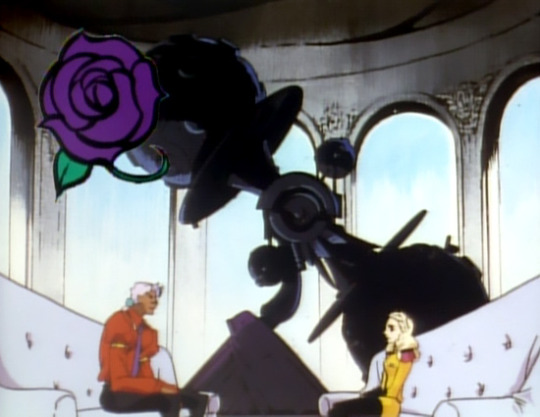
The one and only purple rose in the series. The purple rose of Nanami-thinks-this-guy’s-sketchy.
I do feel this is Akio’s “true colour” in a way, because Nanami seems to see through him more than anyone else does. It also does relate to the lavender rose he wears, because roses can be lighter or darker depending on mood as we’ve seen.
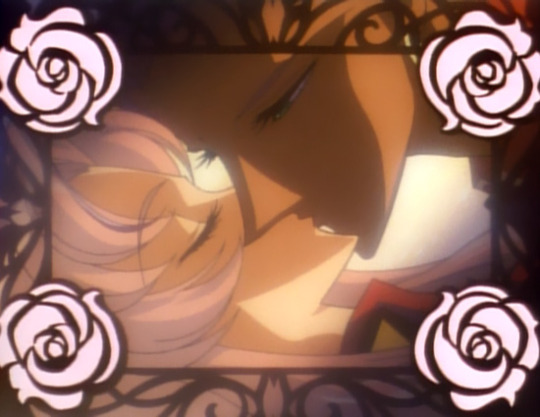
Utena’s reaction to Anthy saying Akio doesn’t discriminate when it comes to girls. Pink roses for thinking of herself, pale for purity/nobility. But we kissed, she seems to say. That was real, right? I’m not really just another girl to him?
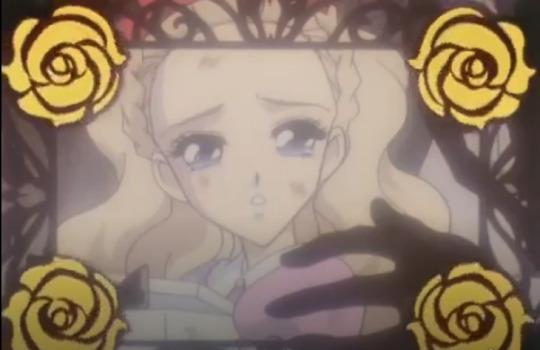

Sorry for the contrast in quality ^^;;
I think it’s interesting that both these shots pop up while Nanami’s crying about Touga not being her brother, saying she loves him and shouting at him to go home. It’s not an animated sequence, they appear individually separated by a flash of the present. So she’s not just thinking of Touga comforting and kissing her, but the fear beforehand. She’s spent so much of this episode insisting that her parents get on well with her, this type Bs can’t get on stuff has to be wrong. And here is her actual memory of one of her parents, a dark hand reaching to pull her away from Touga. He’s not just her brother he is, damaged and damaging as his love is, the only one who’s ever loved her at all.
Also, her roses get brighter here, paler than they’ve ever been when appearing in the frame. Is there a new clarity here as she realises both that she still loves him and that she honestly can’t deal with him right now?
In keeping with Juri’s double-parter, after all these frames in episode 31 we get none at all in episode 32. Nanami’s memories appear as she fights, but unframed now.
5 notes
·
View notes
Text
Season 1 Flashbacks
I really love the ways Utena uses animation in various memories and flashbacks. There’s both an overall style to them that ties them together and different visual elements used to show the different ways different people remember, from traumatically vivid memories to memories of an event you know happened but no longer remember the details of.
So, I wrote some thoughts on all the season 1 flashbacks, although I’ve probably said a lot of really obvious things.
Episode 1 — Utena’s flashback
It’s very theatrical, right from the start with a curtain going up. The flat shadows on the background make it even more so — it’s not just that the silhouettes replace barely remembered people, the entirety of the scenery is false.
The sudden flashes of accurate animation seem to indicate the few real events that she remembers enough to have built the fairy tale around, but it would be reasonable to assume she remembers they happened rather than actually remembering them in the visual detail we’re seeing. Mistaking Touga for her prince makes much more sense if she doesn’t actually remember he had dark skin and white hair.
The silhouettes, too, are a stylish way to show only barely remembered people, but I don’t think they necessarily mean the only thing anyone remembers is hair colour.
Also, I just like that Utena remembers a totally non-existent horse. Princes have horses, right?
Episode 5 — Miki’s flashback
Miki’s flashback starts out framed like old sepia pictures. It’s a warm look and a very nostalgic one.
The colours become colder and the outlines firmer once it’s the specific story of the concert and not just a nostalgic memory of any and every time they played the piano in the garden, but it’s still heavily stylised. Miki and Kozue both remain silhouetted, suggesting he doesn’t know who either of them were back then. The colours get colder and darker still once Miki is ill and then when Kozue won’t play the piano again. The whole thing is more detailed and real than Utena’s flashback, but still suggests an event that Miki remembers remembering perhaps more than he remembers exactly what happened.
Episode 5 — Kozue’s flashback
Kozue’s image of them makes them both silhouettes, too, casting doubt on whether her memory is accurate either. Her picture is the very nostalgic sepia tone we started off with in Miki’s, even though she’s saying she never enjoyed it and talking about the concert. Her black rose duel kind of gets back into this, that she wants to return to those days just as much as Miki.
There are red rose petals in the background of hers, too, which… I think red can often be associated with desire for something. Red things in Utena are often desirable — the Akio car, Anthy when she’s playing the Rose Bride role, and Touga himself is desired and plays on that a lot.
Episode 6 — Mitsuru’s flashback
You know, I wasn’t sure whether to include this. But it’s still a flashback, it’s an important formative experience for Mitsuru, and it has a bit in common with the episode nine flashback in which some other boys also can’t save a girl.
It’s told in semi-shadows. Not the silhouettes of imperfect memory, but something more like the shock of not being able to take in everything at once. The background is very bright, whited out, and only the bull, Nanami, Touga and Mitsuru are really remembered.
Touga’s age seems a little wrong here for how small Nanami is. Maybe it’s Mitsuru’s hero worship colouring things, but he did apparently just punch out a bull, so who knows.
There’s also a parallel between Mitsuru and Utena, here, in that they’re very devoted to becoming a “prince” or a “big brother” which has nothing to do, really, with becoming royalty or literal family. Mitsuru’s sneakier than Utena, though, willing to put Nanami in danger in order to save her and fulfil the role he’s set himself, making him more — hilariously — a parallel to Touga who will do exactly the same thing to Utena herself.
Episode 7 — Juri’s flashback
Juri remembers the people in detail, but the background is stylised and black and white and the poses are often staged. She remembers everyone involved, but the exact events are lost in the general thrust of the developing love triangle.
This is the first time a flashback comes with an associated photograph. One of the memories takes place during a class photo shoot — did Shiori really whisper that exactly then, or is Juri imposing it on a moment she has reason to be especially well able to recall?
As a side note it feels weird to see the student council in normal Ohtori uniforms, a reminder that they’ve been in Ohtori longer than they’ve been in the duelling game. Given that Ohtori has an attached elementary school and Miki, Kozue, Touga and Nanami appear to live locally enough for their actual houses to be within Akio’s sphere of influence, I wonder if they have any sense of how weird any of this is? Have their whole lives just been mildly surreal?
Episode 9 — Saionji’s flashback
This and Nanami’s flashback are the most intense, probably because Saionji and Nanami seem actively traumatised by these events. To the point both of them attempt to lash out and kill Utena while caught up in reliving them.
The first thing that’s interesting about this flashback is that Saionji is telling it to Utena, who remains completely unaware that she appears in it. The two of them have made such different stories out of the memory that they can’t reconcile them at all — Utena doesn’t even remember Touga and Saionji were there and he can’t recognise her as the girl they wanted to save.
Saionji’s first flashback image is a warmly sepia coloured picture in which he and Touga appear as silhouettes. Incongruously it makes him scowl and declare he won’t lose to Touga. Like Miki’s sunlit garden, it appears to be a nostalgic image of something they did a lot rather than a memory of a specific scene.
They start out as greyscale faceless silhouettes, with Saionji’s bandage standing out white, and then are suddenly lit into colour when Touga sees the funeral and stops. It’s a neat effect, as they go from a general memory of something they’d done dozens of times, the hurt hand the only unusual thing about it, into the vividness of a specific and traumatic memory.
It’s only himself and Touga that Saionji remembers clearly, though. The adults in the memory remain silhouettes and Utena herself is one, recognisable by her pink hair.
It’s not clear whether the background is greyscale or whether it’s just the darkness of the storm, but the coffins are not, and the red roses on them stand out especially. Juri’s flashbacks tend to black and white with orange standing out, Saionji and Nanami both have flashbacks where red is the dominant colour.
Nothing about the memory is stylised or staged, though. Saionji may not understand the people involved, but he seems to recall the events very accurately. The fact that Touga spends the memory behaving rather strangely only makes it more plausible.
When Saionji flashes back again after hearing the word “kamikakushi” he can’t see anyone’s faces, as if he’s no longer sure who he and Touga were back then either.
Not a flashback, but I really appreciate the way the greyscale picture of Touga in bed with a bandaged chest echoes the grayscale picture of Touga and Saionji on the bike with Saionji’s bandaged hand.
Episode 10 — Nanami’s flashback
Oh, Nanami.
The shot of the birthday cake gives us a much more fixed time for this flashback than any of the previous ones. It’s Touga’s birthday, and you can count the candles to find out that he’s twelve. You can also see this is the same mansion they’re living in now, the vaguely threatening shot showing layers of empty halls and doors is virtually identical to the later one where Touga is telling Nanami why she shouldn’t be a lesbian. (If there’s a connection, I’d guess it’s that Touga is becoming one of the adults who shuts her out and doesn’t try to understand her.)
The adults are certainly threatening here, a faceless, colourless mob, where you can’t even really pick out Nanami’s parents. Touga and Nanami are the only ones in colour — they’re also the only children present. Touga seems to be both enthroned and surrounded, people are calling him Touga-sama and kneeling, but is this really the kind of party a twelve-year-old would want?
The way Nanami reacts when her father tries to grab her, and how quickly — and adultly — Touga intervenes just makes the adults seem more of a threat. You can see why Nanami misses being sure her brother was on her side when she’s never had anyone else.
Interestingly, when Nanami resumes her flashback for the more traumatic part, she and Touga are now greyscale. The only thing that stands out is the red of the apples he won’t help her pick. Something Nanami wants, but needs Touga to gain.
Honestly, I think getting angry with Nanami for hitting his cat is the most emotion we see Touga display, ever? Even in Saionji’s memory, his emotions are very guarded, here he’s reacting far more like you’d expect a child to react. Although Nanami’s response to it suggests that she’s not used to this kind of reaction from him. She’s taking it as a serious rejection, not as her brother being upset with her right now.
Nanami is now standing in front of her own memory, as if it’s a cinema screen and she can watch it all unfold over again.
In the last section of her flashback her dress and hair are yellow again, for the first time her own colour is the one notably present in addition to black and white. (She was in colour earlier, but wearing pink and red.) The part she most associates with herself is the worst part, the kitten’s death and her own remorse.
There are also a few flashes of green in bits of her memory, an adult’s suit and the leaves Touga was playing with the kitten with. Jealousy?
The way her killing the kitten and regretting it is interspersed with her attacking Utena suggests she really did intend to kill Utena but, like the kitten, would have regretted it immediately if she’d succeeded.
#utena#revolutionary girl utena#very long post#I hope no one is reading this on their phones#I'm sorry#Touga gets no flashbacks but everyone gets flashbacks about him#Utena nearly gets killed twice in a row by people having flashbacks#memories are dangerous things
14 notes
·
View notes